军事英语翻译竞赛
军事英语期末考试题及答案
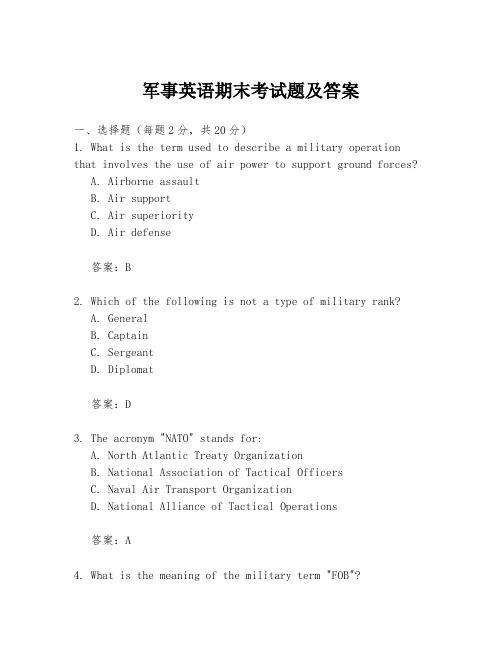
军事英语期末考试题及答案一、选择题(每题2分,共20分)1. What is the term used to describe a military operation that involves the use of air power to support ground forces?A. Airborne assaultB. Air supportC. Air superiorityD. Air defense答案:B2. Which of the following is not a type of military rank?A. GeneralB. CaptainC. SergeantD. Diplomat答案:D3. The acronym "NATO" stands for:A. North Atlantic Treaty OrganizationB. National Association of Tactical OfficersC. Naval Air Transport OrganizationD. National Alliance of Tactical Operations答案:A4. What is the meaning of the military term "FOB"?A. Forward Operating BaseB. Field of BattleC. Frontline Observation BaseD. Fire on Base答案:A5. The term "C4ISR" refers to:A. Command, Control, Communications, Computers, Intelligence, Surveillance, and ReconnaissanceB. Combat, Control, Command, Information, Systems, and RadarC. Communications, Command, Control, Information, Support, and RadarD. Command, Control, Communications, Information, Systems, and Radar答案:D二、填空题(每空1分,共10分)6. The military abbreviation for "Immediate Action" is ______.答案:IA7. A military ______ is a high-ranking officer in charge of a military unit.答案:Commander8. The phrase "All clear" in military terms means that thearea is ______.答案:safe9. The military term "BDA" stands for ______.答案:Bomb Damage Assessment10. The acronym "OPSEC" refers to ______.答案:Operational Security三、简答题(每题5分,共20分)11. Define "Asymmetric Warfare".答案:Asymmetric Warfare refers to conflict situations where adversaries have significant differences, in military capability, strategy, and tactics, often involving a smaller, weaker force using unconventional methods to counter a larger, technologically superior force.12. Explain the concept of "Force Protection".答案:Force Protection is a set of measures andprocedures taken by military forces to ensure the safety and security of personnel, equipment, and facilities frompotential threats such as enemy attacks, accidents, andnatural disasters.13. What is the purpose of "Tactical Deception"?答案:Tactical Deception is the deliberate use of misinformation, concealment, or other means to mislead an adversary, causing them to make incorrect judgments and take actions that can be exploited by the deceiving party.14. Describe the role of "Logistics" in military operations.答案:Logistics in military operations is the planning, directing, and controlling of the flow and maintenance of materials, personnel, and services from the point of originto the point of consumption to support the military mission.It includes transportation, supply, maintenance, medical support, and other essential services.四、阅读理解(共20分)15. Read the following passage and answer the questions below."The military doctrine of 'Overwatch' is a strategy that involves maintaining a presence in a high-altitude area to provide support and surveillance. This can be achievedthrough the use of unmanned aerial vehicles (UAVs) or manned aircraft. The concept is to have a 'bird's eye view' of the battlefield, which allows for better situational awarenessand the ability to react quickly to emerging threats."(a) What is the main purpose of the 'Overwatch' doctrine?(5 points)答案:The main purpose of the 'Overwatch' doctrine is to provide support and surveillance from a high-altitude area, enhancing situational awareness and the ability to react quickly to threats.(b) What are the two types of aircraft that can be used to achieve the 'Overwatch' doctrine? (5 points)答案:The two types of aircraft that can be used toachieve the 'Overwatch' doctrine are unmanned aerial vehicles (UAVs) and manned aircraft.(c) What does the term 'bird's eye view' refer to in the context of the 'Overwatch' doctrine? (5 points)答案:In the context of the 'Overwatch' doctrine, the term'bird's eye view' refers to having a comprehensive and high vantage point of the battlefield, which aids in better understanding and control of the situation.五、翻译题(每题5分,共30分)16. Translate the following military。
军事英语词典(打印版)

A 空中发射的(美军导弹及火箭代字中的第二个字母,表示发射环境,如果已定型生产,该字母则为第一个字母)AA antiaircraft 如 an A A artillery unit 高射炮部队AAM air-to-air missile 空对空导弹abandon v 弃机;离机---指机上人员跳伞AB air base; airbase 空军基地ABC (atomic, biological, chemical )warfare 原子、生物[细菌]、化学战abeam ad (1) 横向;正侧方---与飞机或车辆纵轴成直角 (2) 正横---与船的中线成直角ABM anti-ballistic missile反弹道导弹的 如:ABM capability; ABM radar; ABM systemA (atomic )-boat 核潜艇A (atomic )-bomb 原子弹abort (1) a 非因敌人行动而引起的 (2) v 中断起飞;中途返航;中断飞行;中断发射;中断试验 (3) n 中断飞行的飞行器;紧急中断;夭折;失败abreast ad (1) 并列---指舰船行进时 (2) 并靠---指舰船 (3) 在同高度并排飞行academy n 军官学校;(大写)美国空军军官学校access n (1) 通路 (2) 接近路 (3) 能接触核武器并有可能使其爆炸的条件accessibility n (1) 可达性;可接近性 (2) 飞机能在各种地带起降飞行的适应力accession n 入伍;增加新员accommodation n (美常用)招待设备;膳宿供应;居住舱室accredit v 委任;派遣;特派acquire v (1) 用于搜索目标时,表示侦察目标,确定其位置,以便识别 (2)用于跟踪雷达时,表示用雷达波束跟踪目标,以便用武器进行攻击acquisition n (1) 发现;探测;搜索 (2) 捕获;截获 (3) 目标指示 (4) (目标资料)获取和积累 (5) 目标定位 (6) 天线定向action n (1) 军事行动 (2) 战斗 (3) (炮兵)放列activate v (1) 将已有番号的部队或单位正式建成 (2) 将预备役或退役的舰艇或飞机改为现役 (3) 触发;开动;启动 (4) 使产生放射性activation n (1) (机构或单位)成立或建成 (2) 整修---将预备役舰船等修理加装,准备服役active a (1) 主动的;有源的 (2) 有效的;现行的;现役的 (3) 放射性的;活性的A (attack)-Day A日;进攻日A damage A级毁伤---飞机受到这种毁伤后不能返回基地adjacent a 邻近的;毗连的 如adjacent troops; adjacent zoneadjust v (1) 调整;调节;调准;校正 (2) 试射 (3) 修正炮火adjutant n 副官;人事行政参谋administration n (1) (陆、海)军事行政---主要是后勤、人事等 (2) (空)行政管理 (3) 后方勤务---尤指英军 (4) 署、局等行政机关administrative a (1) 军事行政的 (2) 行政管理的 (3) 后方勤务的 (4) 非战斗的admiral n (1) (美)海军上将 (2) 海军将军的通称 (3) 舰队司令 (4) (海军上将所乘的)旗舰advance (1) n 前进;进展;提前;超前 (2) a 前进的,先头的;预先的advanced a 前进的;在前沿的;在前面的 如advanced air base 前进空军基地;前进机场advisory 情况通知[通报]---(通常指)由飞行保障勤务单位发给驾驶员或指挥人员,通告完成飞行需要了解的有关事项aerial (1) n (英)天线---美国常用antenna (2) a 航空的;空中的 (3) a 空气的aero- (1)(构词成分) a 空气的;飞机的;航空的;飞行的 如aero-amphibious warfare 海陆空联合作战 (2) n 海军气象准尉---aerographer 的缩写 (3) n 航空学---aeronautics的缩写aerobat v n 特技飞行aerodrome n (英)飞机场;航空站---美军用airdromeaeromarine n 水上飞机aerotow v n 空中拖航AEW aircraft 空中预警机---air early warning aircraftAffirmative n 《通》是的;同意AFB air force base (美)空军基地A(atomic)-head 核弹头AHQ army headquarters 集团军司令部AICBM anti-intercontinental ballistic missile反洲际弹道导弹的 如AICBM system 反洲际弹道导弹系统AIC ammunition identification code 弹药识别代号aide n 助理;随从参谋—aide-de-camp的简称AIM air intercept missile 空中截击导弹ambush n (1)伏击 (2) 设伏地点 (3) 伏兵ammunition n 弹药amphibian (1) a 两栖的;水陆两用的;水空两用的 (2) n 水陆飞机;水陆坦克amphibious a 两栖的;水陆或水空两用的annihilate v 歼灭;消灭AOC air officer commanding 空军指挥官A of F Admiral of the Fleet(英)海军元帅approach (1) 接近;进口;接近路 (2) (飞行)进近;进场;进场着陆 (3) (进攻时)接敌;以疏开队形战斗前进 (4) 飞机着陆方向;飞机加入起落航线方向;飞机空中受敌机攻击的方向 (5) (轰炸)进入目标---进入轰炸航路的飞行动作 (6) (复)跑道两端的净空区apron n (1) 停机坪 (2) 伪装天幕;伪装网 (3) 铁丝网面---屋顶形 (4) 海军码头的卸货场 (5) 气球阻塞网 (6) 回车场armada n (1) 舰队 (2) (飞机)机群armament n (1)(复)军事装备 (2) 军械;武器 (3) 战斗部;弹头armo(u)r n (1) 盔甲 (2)(总称)装甲板 (3)(总称)装甲部队;装甲兵(种) v 为…穿盔甲;为…装甲array v 排列;按战斗队形排列; 配置 n (1) 列阵;队形;战斗序列 (2) 《雷》天线阵arsenal n 军火库;兵工厂artillery n (1)(总称)火炮;大炮 (2) 炮兵(兵种)AS air station 航空站ASM air-to-surface missile 空对地导弹assault n v 冲击;强击;突击;攻击A(Attack) (1) 攻击机(飞机的基本用途和类型符号) (2) 攻击(改装后飞机的用途符号)ASW antisubmarine warfare 反潜战AT antitank 反坦克ATC (1) Air Transport Command 空运司令部 (2) Air Tactical Control 空中战术控制AUM air-to-underwater missile 空对水下导弹AUS Army of the United States 美国陆军Auxiliary [R:g5ziljEri] a 辅助的;补助的;附属的BB Bravo 美军常用字母代号B 能在多种条件下发射的(美军导弹及火箭代字中的第二个字母,表示发射环境,如果已定型生产,该字母则为第一个字母)babble v n 无线电通信干扰;雷达干扰---雷达或无线电通信中因很多线路纠缠造成的干扰或串音backblow n 后坐;后坐力;反冲backloading n 后送;撤退---在战区内的装备、物资、伤亡人员的后送backlog v n (1) 积压;搁置 (2) 待送修件;待运送件;待处理件 (3)储备品 (4) 战斗储存量backup a 备用的;替代的;支持性的;辅助的badge n (1) 奖章 (2) 符号 (3) 徽章;胸章;袖章;领章;帽徽等baffle v 施放干扰;对抗,使挫折bag n (1) (空战中)被击落的敌机总数 (2) 《炮》药包 (3) 行李;辎重 v 击落;击毁(敌机等)bail (bale) out v 跳伞 如bailer《口》跳伞balk v n (1) 阻碍;障碍 (2) 不成功的着陆;需要复飞的;着陆失败ball n (1) 弹丸;子弹 (2) 燃烧着的信号弹ballistic a 弹道的band n (1) 多层铁丝网 (2) 火制地带;密集火力地带 (3) 波段;频带 (4)军乐队bandage n 绷带bank v n (1) (飞行)倾斜;坡度;带坡度转变 (2) 压坡度banquette n 射击踏垛barbette n (1) 炮垛 (2) (军舰上的)露天炮塔;炮塔座barrack n (常复)兵营;营房barrage v n (1) 弹幕射击;拦阻射击;弹幕拦阻网 (2) 气球阻塞 (3) 拦阻;阻塞 (4) 拦阻轰炸barrel n 枪管;炮管barricade n (1) 路障;障碍物 (2) 航母飞行甲板上之阻拦网 v 设置路障base n (1) 基地 (2) 基地司令部的简称 (3) 底座;弹底 (4) 基准单位;基准线battalion n (1) 营;营部 (2) (常复)部队;军队batter v 连续猛击;炮击;用炮火打开缺口battery n (1) 炮兵连;兵器群;(一艘舰艇上的)炮组 (2) 炮的待发射状态bayonet n (枪上的)刺刀bazooka n 火箭筒;反坦克火箭炮B damage B级毁伤---飞机受到这种毁伤后不能返回基地bearing n 方位;方向;方位角besiege v 包围,周围;围攻billet v n (1) 宿营;设营;宿舍分配 (2) 职位;工作blast v n (1) 爆炸;爆破 (2) 爆炸气浪;冲击波 (3) 发射(运载火箭)blockade v n (1) 封锁 (2) 实施封锁的部队 (3) 封锁行动blue alert 空袭警报bombard v 炮击;轰炸B(Bomber) 轰炸机(飞机的基本用途和类型符号)breach v n (1) 突破;突破口 (2) 排雷brigade n 旅brigadier n (1) 旅长 (2) (英)陆军(或海军陆战队)准将brigadier general (美)陆军(或空军、海军陆战队)准将breather n 通气装置;防毒面具buffer v n 缓冲burst n 点射;连发射击CC Charlie 美军常用字母代号C 水平储藏或小于45度角的储藏,并从地面发射的(美军导弹及火箭代字中的第二个字母,表示发射环境,如果已定型生产,该字母则为第一个字母)cabin n (1) 舰长室;船长室 (2) 军官室 (3) 机舱cadet n 军校学员;军官候补生caliber n (1) (枪、炮等)口径;内径 (2) (炸弹等)弹径calibrate v 校准camouflage v n 伪装;掩饰canister n 霰弹;霰弹筒cannon n 火炮;加农炮;机关炮canteen n (1) 军用水壶;饭盒 (2) 军人小卖部cantonment n (1) 驻扎;宿营 (2) 临时营房captain n (1) (美)陆、空、海军陆战队上尉 (2) (美)海军上校 (3) 舰长 (4) 机长;领队C(Cargo/Transport) (1) 运输机(飞机的基本用途和类型符号) (2) 运输(改装后飞机的用途符号)cartridge n 子弹;弹药筒;弹壳casualty n (1) (常复)伤亡人员---包括被俘、失踪、患病、潜逃、被拘留的军人 (2) 伤亡catafighter n 弹射起飞的战斗机catapult v n 弹射;弹射器catering n 给养;供应伙食cavalry n (1) 骑兵 (2) 高度机动的地面部队CBR (chemical, biological, radiological) warfare 化学、生物、放射性战C(commence)-Day C日;部队之物资、武器等开始展开之日C damage C级毁伤---飞机受到这种毁伤后不能返回基地CG (1) Coast Guard 海岸警卫队 (2) commanding general (将军级)司令官chaff n (1) 干扰物;干扰箔片 (2) 诱饵云chaplain n 随军牧师charge v 装药;装弹;装料chief pretty officer (美)海军军士长cluster n 集束炸弹CM system 电子对抗系统---countermeasure systemCNN cannon 加农炮colonel n (1) 陆军、空军或海军陆战队上校 (2) 中校---lieutenant colonel 的简称column n 纵队;小分(遣)队;(舰队的)纵阵combat v n 战斗;作战;格斗commandant n (1) 指挥官;司令(尤指要塞或防区司令) (2) 军事学校校长commander (美)海军中校commodore (美)海军准将commando n 突击队;突击队员commission n (1) 授衔令;所授军衔;任职令 (2) 委员会 v (1) 委任;委托 (2) 编入现役;开始服役company 连;连部complement n (1) 编制人数;编制人员;(飞机及船只的)乘员定额 (2) 装备定额;装备标准 (3) 各种额外的和配属的部队单位 v 补充;补足composite a 合成的;混成的 n 混合编队;混成部队conscript v 征募;征(兵);征召…服役 n 应征士兵contact v n (1) 接触;接点 如 a contact battle 遭遇战 (2) (飞机升空后再)接地,一次起降 (3) 能目视地面(飞行),如CFR (contact flight rule)目视飞行规则contain v 钳制;围困 如contained war 区域性战争---敌对行动限于特定地区之战争contingent n 小分队;分遣部队conventional a 常规的converge v (炮兵)集中火力射击convoy v n (1) 护航;护送;护运 (2) 护航队;护送队 (3) 被护送的部队corps n (1) 军 (2) 兵种 (3) 部队court-martial n 军事法庭;军法审判 v 军法审判cruise v n 巡航cruiser n (1) 巡航机 (2) 巡航舰;大型快船 (3) 远程带翼导弹DD Deltta 美军常用字母代号D 诱骗用(美军导弹及火箭代字中的第三个字母,表示任务,如果已定型生产,该字母则为第二个字母)D-bomb 深水炸弹D-Day D日;(1)预定进攻发起日 (2) 陆军中某一新部队建立之日 (3) 特定军事行动开始日decentralization n 分散;分散指挥deception n 欺骗;迷惑;伪装;遮盖decoy n 假目标;诱饵 v 诱惑deflection n (1) 偏转;偏移;偏斜 (2) 偏度;偏差 (3) 《高炮》提前修正量deliver v 投放(炸弹等)demolish v 爆破;破坏;折毁demonstration n (1) 表演;示范;示教 (2) 佯动DoD Department of Defense 国防部deploy v (1) 开伞 (2) 展开;疏开;部署;调度depot n 兵站;补给站;供应站;仓库;维修与供应基地deputy chief of staff 副参谋长designation n 番号;标号;名称detach v 分遣;派遣detachment n 分遣队;独立小分队deterrence n (1) 威慑 (2) 威慑物;威慑因素detonate v 起爆;爆炸D(Director) 控制,此种飞机能控制无人驾驶飞机或导弹(改装后飞机的用途符号)disarmament n (1) 裁军 (2) 放下武器;解除武装discharge v (1) (枪炮)发射 (2) 撤职;免职 (3) 退伍 (4) 卸载 (5) 排出;解除 (6) 退弹disengage v 脱离战斗;脱离接触disperse v 疏开;疏散disposition n 部署;配置dive v 俯冲;下潜diversion n (1) 转换;转向;偏离规定航线 (2) 飞向备降机场(航母) (3) 改变空中飞机的任务、目标或目的地 (4) 牵制division n 师dodge v n (1) 射开;闪避 (2) (目标的)快速运动;进行规避机动[动作]Doppler 多普勒draft v 征兵draftee n 被征士兵;应征入伍者drill v n 操练;训练drone n 无人驾驶飞机;靶机drop v (1) 下降;下沉 (2) 空投;投放;伞降dummy a 做幌子的;假的 n (1) 模仿物---如假目标、假密码、假人等 (2) 佯攻EE Echo 美军常用字母代号E 带有特殊电子设备的(美军导弹及火箭代字中的第三个字母,表示任务,如果已定型生产,该字母则为第二个字母)E(enemy)-boat 敌船---战时对在沿海活动的敌性国船只的称呼echelon n (1) 梯队;梯次配置 (2) 指挥层次;指挥机构 v 把…排成梯队;形成梯队ECM electronic countermeasures电子对抗E(exercise)-Day E日;演习开始日egg 《口》(1) 航空炸弹 (2) 深水炸弹 (3) 水雷;地雷;手榴弹eject v (1) 喷射;弹射 (2) 抛壳;退弹element n 机组;部队;小单位;分队elementary a 初级的;基本的;简单的E(Special Electronic Installation) (1) 特种电子设备机(飞机的基本用途和类型符号) (2) 特种电子设备(改装后飞机的用途符号)elevation n (1) 立视图;正视图;纵剖面图 (2) 高度;标高;海拔 (3) 仰角;射角 (4) 上升;提高embark v (1) 上船;搭机 (2) 搭载;装货emplace v 放列;火炮等进入阵地emplacement n (1) 放列动作 (2) 发射阵地 (3) 炮火掩体employment n (兵力的)使用;运用encode v 加密endurance n (1) 续航力;耐航性 (2) 持续性;持续时间enfilade v n (1) 纵射;纵向射击 (2) 纵射炮火engage v (1) 交战;进入战斗 (2) 攻击;射击;攻击指定目标 (3) 接通;接合;(4) (电话)占线enlist v 入伍;应募enlistee n 应募入伍者;志愿兵enroll v (1) 入伍;服役 (2) 编入en route (enroute) (1) 在途中 (2) 途中的;行进中的;航线(路)的ensign n (1) 旗;军旗 (2) (表示等级、职务等的)标志;徽 (3) (美)海军少尉entrench v 挖壕;构筑堑壕envelop v 包围escort v n (1) 护航;护送;护卫 (2) 护航部队;护航飞机;警卫队 (3) 护送卫兵;武装仪仗队evacuate v (1) 后送 (2) 疏散 (3) 撤离evasion n 规避动作;规避机动;闪避动作;回避;逃避EW electronic warfare 电子战exercise v n 演习;操练;演练expendable a (1) 消耗性的 (2) 使用一次的;不可回收的expert n 特等射手explosive n (1) 爆炸物;炸药 (2) (复)爆破器材 a 爆炸(性)的;爆发(性)的ex-service man (ex-soldier) 退役军人extend v (1) 延伸;延长 (2) 伸出;放下(起降架、襟翼等) (3) 扩大;扩展;疏开extract v 退弹extraction n (1) 退弹 (2) 拖出;抽出;排出 如extraction drop 伞拖空投;extraction zone 低空伞投地带;伞拖空投地区FF Foxtrot 美军常用字母代号F 由单人携带并发射的(美军导弹及火箭代字中的第二个字母,表示发射环境,如果已定型生产,该字母则为第一个字母)fader n 识别不明的飞机faker n 假设敌机---防空演习用fallout n 回降物;放射性微粒 如fallout contamination放射性沾染fallout -free无放射性沉降的fan out (飞机编队的)扇区展开far infrared 远红外F(fire; filler)-Day F日;(1) 发射日 (2) 补充人员编入日feed v (1) 进弹;装弹 (2) 输入信号 n (1) 弹带;弹链 (2) 雷达天线的馈电部分freeder unit 补给单位feint v n (1) 佯攻 (2) 佯动 (3) (渡河战斗)佯渡fence n (1) 《通》按指示设置声纳浮标音障 (2) 雷达预警线 (3) 防地物干扰篱笆ferret n 电子侦察机;电磁探测飞机 v 搜索---利用机载电子设备搜索目标ferry v n (1) 渡口 (2) 空中转场交接;飞机渡运---指飞机用本身动力从接收地区飞至使用地 (3) 空运 (人员或器材) (4) (飞机)空中转场field n (1) 战场 (2) 作战训练或演习区域 (3) 机场;着陆场F(Fighter) 战斗机(包括截击机和进行对地面支援的多用途飞机)(飞机的基本用途和类型符号)filler n 补充人员;等候分配的流动人员;候补人员filler depot 补充仓库filter n 过滤器;滤波器;滤色镜 v (1) 过滤 (2) 情报鉴定;整编first lieutenant (美)陆、空、海军陆战队中尉fixing force 阻击部队flak n (1) 高射炮火 (2) (总称) 高射炮flak vest 防弹背心flak suit 防弹服---尤指防高射炮flank n 翼侧;侧面 v 从侧翼攻击;侧翼包围flare n 照明弹;曵光弹 v (飞机)拉平flat a (1) (弹道等)低平的 如flat fire 低伸射击;平射 (2) (飞行等)小坡度的;小角度的 如flat glide 小角度下滑fleet n (1) 舰队 (2) 全部海军作战部队 (3) 大机群 (4) (飞机的)总数fleet admiral (美)海军五星上将flight n (1) 飞行;一次飞行任务 (2) 空军小队 (3) 四机以上的机群 (4) 火箭的齐发 (5) 航程;射程 (6) 两栖作战中之分波 (7) 炮弹由炮口至弹着点的径道flying officer (1)(英)空军中尉 (2) 飞行军官flying wing (英)空军联队FM frequency modulation 调频foe n 敌人;敌军follow(-)up v n (1) 追击 (2) 探询 (3) 后续部队与物资之登陆或跟进 (4) 随动;跟踪foray v n 突然侵袭;袭击force n 军队;兵力 v 夺取;攻克;强攻 如force a corridor 开路;打开通道force designator 部队番号;部队代号formation n 编队;队形;兵团fortress n 要塞;堡垒front n (1) 前方;前线 (2) 正面;战场的一个方面full admiral 海军上将full general 上将full strength 满员fuze n (1) 引信;信管 (2) 导火索GG Golf 美军常用字母代号G(Permanently Grounded) 永久停飞,用于地面训练(飞机发展阶段的符号)G 攻击地面或海面目标的(美军导弹及火箭代字中的第三个字母,表示任务,如果已定型生产,该字母则为第二个字母)galloper n (1) 传令官 (2) 轻野炮;轻便炮车gauge n (枪、炮等)口径GAM guided aircraft missile 机载导弹G-agent 一种毒剂G aircraft 接G方案改型的飞机---指改型为搜索救援用的美国海军飞机gallery n (1) 坑道---特指布雷区坑道的一部分 (2) 弹药储藏室 (3) 室内靶场 如gallery practice室内射击练习 (4) 通路;通道;地下通道 (5) 平台;工作台;(防空指挥所的)控制台;操纵台 (6) 地道---导弹发射场内隐蔽人员及存放仪器设备的地下场所gap n (1) (飞机的)翼隔 (2) 《雷》盲区;空白区 (3) 缺口;突破口 如gap fire 间隙火力---通过已方部队间隙所发射的火力garbage can 《口》深水炸弹garnished net 伪装网garrison n (1) 卫戊部队;守备部队 (2) 驻地 (3) 要塞 v 派兵驻防 如garrison duty 卫戊部队gas 毒气;化学毒剂gas helmet 防毒面具gear n (1) 齿轮 (2) 飞机起落架各类工具、器材、机械的统称 (3) 装备gel-filled bomb 凝固汽油(炸)弹General (美)陆、空、海军陆战队上将general engagement 会战general offensive 总攻germ weapon 细菌武器General of the Army (美)陆军五星上将General of the Air Force (美)空军五星上将G-Hour G时---发出执行某一个行动命令的时间GI 《口》士兵;美国大兵---government issue (一切都由政府发给)的缩写G-Day G日;发出执行某一行动命令之日GOCINC,GOC(inC), G O C(-in-C) General Officer Commanding (-in–Chief) 总司令GP bomb 普通炸弹---GP为general purpose 的缩写grape n 霰弹;葡萄弹graze v (1) 低掠 (2) 瞬(着)发 如 graze fuze 瞬发引信;grazing 水平射击;低伸射击green berets 绿色贝雷帽---美国特种部队的别称grenade n 手榴弹;枪榴弹grenade-thrower 掷弹筒grid n 坐标方格;坐标方格网ground n (1) 靶场;试验场 (2) 禁止飞行;停飞 (3) Hit the ground 卧倒group n (1) 大队---空军或海军建制单位 (2) 《雷》集群目标显示;机群目标显示group commander (1) 群长;机群长 (2) 大队长;大队司令group control vessel 特混大队指挥舰GS general staff (1) 一般参谋 (2) 参谋部GSO general staff officer 一般参谋G series G系毒气---一组能使血液及神经中毒的强烈持久性毒气G-suit 抗荷服;防失重服;抗过载飞行衣Guer(r)illa n 游击队;游击队员guidance n 制导guide n 基准部队;基准兵;基准舰 v 引导;制导gunnery n (1) (总称)重炮 (2) 射击 (3)射击学;射击技术;枪炮操作HH Hotel 美军常用字母代号H 在竖井中垂直储藏并从地面发射的(美军导弹及火箭代字中的第二个字母,表示发射环境,如果已定型生产,该字母则为第一个字母)halt v n (1) 停止;停住;《令》立定 (2) 行进间休息halt and freeze 立定halt area 休息地区---部队集结、就餐、整顿、休息或添加燃料的地区halting of troops 部队中途休息hand arms 手提兵器---可以随身携带使用的兵器 如手提机枪、手枪、自动手枪、剑等handling (1)操纵;驾驶;控制;调节 (2) 操纵性;操纵特点 (3) 处理;装卸;操作 (4) 维护;保管;管理handover (飞机)指挥的移交---把对飞机的指挥从一个指挥机构移交给另一指挥机构 hangar n 飞机棚;机库 v 把(飞机)放入机库中hanger n 木架;挂钩hangfire (1) 迟缓发射;迟发---发射药、雷管或点火装置暂时失灵或作用迟缓而发生的迟发现象 (2) (航空发动机)延迟点火harass v 扰乱---以突袭、施放毒气、连续射击或其他扰乱的方式困惑敌人,使其不得休息,从而降低其士气与作战效能hard 硬的---能抗核爆炸的hard base 硬基地---能抗核爆炸的导弹发射基地hard site 硬式发射阵地;防原子发射场---能经受核武器以及化学、生物、放射性武器攻击的发射场harden 硬化;强化;加固---使一个地区或设施有防核攻击能力hardness (1)硬度;硬性 (2) 核防护能力;防原子能力hardstand 停机坪;停机场;堆积场hard target 硬目标;难于击毁的目标;防护坚固的目标hard turn 急转弯;大坡度转弯haven n 港;锚泊地;安全地H(hydrogen)-bomb 氢弹HC shell 烟幕弹HC helicopter combat 直升机作战HC high capacity bomb 高能炸弹head (1) 先头部队 (2) 弹头 (3) 取航向---度heading (1) 航向 (2) 电报报头head-on 迎面的;对头的headquarters n 司令部;指挥所heat (1) 热辐射 (2) 热 如 heat homer (1) 热辐射自导引导弹;热辐射寻的导弹 (2) 热辐射导引头;主动寻的装置;如heat weapon 热辐射武器heavy a (1) 重(型)的 (2) 大口径的 (3) 大规模的 (4) (装甲)厚的 (5)(吃水)深的 n (复)重轰炸机heli 《口》直升机heliborne a 由直升机运送的H(Helicopter) 直升机(飞机的基本用途和类型符号)H(Search/Rescue) 搜索、救护(改装后飞机的用途符号)helidrome n 直升机机场helipad n 直升机降落场;直升机停机坪helitroops 直升机空降部队helmet n (1) 钢盔;飞行帽;飞行头盔;潜水头盔;防护帽 (2) 罩;机罩helo 《口》直升机HF high frequency 高频H (hydrogen) head 氢弹头H-hour (1) 进攻发起时刻 (2) 特定军事行动开始时刻high CAP (1) 交空战斗巡逻 (2) 高空战斗巡逻机high capacity bomb 高爆炸弹high explosive 高爆炸弹;烈性炸弹hit the beach 《口》突击登陆hit the silk 《口》跳伞hitting area (1) 命中区 (2) (目标)要害面积hold v (1) 保持;稳住;掌握;控制 (2) 扼守(阵地等)(3) 牵制;牵制性攻击 (4) 将飞机保持在目视或用其他方法识别的位置附近;《通》正(仍)在指定位置待命 (5) 暂停;中断---指火箭发射前准备hold fire 《令》(1) 停止发射 (2) 不要发射 (3) 摧毁已发射的导弹holding 《通》待命---表示正 在指定位置待命holding action 牵制行动holding area (1) 等待空域;待降空域 (2) 待命地域;集中地区holding war 僵持战home v (1) 归航 (2) 引导;(导弹)自导引;寻的hover v (1) (潜艇)悬浮 (2) (直升机等)悬停 (3) (飞行器)在目标上空盘旋hoverway 直升机跑道howitzer n 榴弹炮hunt v 搜索;寻觅;追逐---尤指对潜艇hunter n (1) 搜索飞机;探测飞机 (2) 搜索器;寻觅器hunter-killer (1)(海空协同)反潜 (2) 猎潜飞机 (3) 猎潜舰艇hypersonic 特超音速的---马赫数大于5的II India 美军常用字母代号I 空中截机(美军导弹及火箭代字中的第三个字母,表示任务,如果已定型生产,该字母则为第二个字母)ICBM intercontinental ballistic missile 洲际弹道导弹IFF identification friend or foe 敌我识别器;敌我识别系统IFR flight 仪表飞行—IFR(instrument flight rules) 仪表飞行规则ignite v 点火;着火;发火illuminating bomb (flare, projectile shell) 照明弹ILS instrument landing system 仪表着陆系统imagery n 图像;成像 如imagery interpretation 图像判读impact n 弹着;命中 如 impact error 弹着点误差inactivate v (1) 撤编 (2) 停用 (3) 编入后备役inactive a (1) 非现役的 (2) 仅有番号而未编成的 (3) 停用的---如停用的设施inbound a 归航的;进站的;入境的;向(电)台飞行的incendiary n 燃烧剂;燃烧弹 a 有燃烧作用的incoming missile 进入目标区的导弹;接近目标的导弹induct v 征召;应征入伍inertial a 惯性的;惯量的 如inertial guidance 惯性制导infantry n (总称)步兵inferior a 下级的 n 下级infiltrate v n 渗透;通过inflight (in-flight) 在飞行中;在空中infrared a 红外 的 如 an infrared seeker 红外线寻的制导导弹[弹头]infrastructure n 永久性基地;永久性防御设施inertia n 惯性;惯量 如inertia guidance惯性制导inland 内陆inshore ad 沿海;靠近海岸 a 近岸的;沿岸的installation n (1) 装置;设备;设施;军事设施 (2) 安装;装配;设置intelligence n 情报;情报机构;情报工作intercept v (1) 截击;拦截 (2)侦听;截取(情报等);截获(信号等)intercontinental a 洲际的 如intercontinental ballistic missile 洲际弹道导弹interdiction n (1) 阻止;遮断;封锁 (2) 空中封锁intermediate a 中间的;居中的 如intermediate range missile 中程导弹interservice 军种间的;军种间通用的 如interservice logistics support 军种间后勤支援inventory n (1) 存货清册;物资清单;货单 (2) 现有器材;存货;库存品 IRBM intermediate range ballistic missile 中程弹道导弹JJ Juliett 美军常用字母代号J(Special Test, Temporary) 暂时特种试验(飞机发展阶段的符号)J 暂时性的特殊试验(美军导弹及火箭代字中的第一个字母,表示性质或情况,如果已定型生产,该字母则往往省去)jacket n (1) 外壳;弹壳 (2) 套筒 如jacketed bullet 被甲弹jam v (1) 射击故障---如卡壳等 (2) 无线电干扰jamming war 电子干扰战JCS Joint Chief of Staff 参谋长联席会议 如JCS-directed exercise 参谋长联席会议指挥之演习jeep (1) 吉普车 (2) 小型航母 (3) 小型侦察联络飞机join-up 飞机空中集合jump (1) 跳伞 (2) 《口》从空中攻击 (3) 突变;跳跃;跳动 (4) 《射击》跳偏 (5) 《高炮》定起角;发射差角jump off (1) 出击;发起攻击 (2) 旋翼机的垂直起飞jump-off line 进攻出发线jump-off point 跳伞点---为空中的某一点,伞兵为了准确着落,必须自该点跳下jump speed (1) 《海》反潜直升机从一个水下侧音位置到另一个水下测音位置的平均速度 (2) 跳伞速度---(飞机)能保证跳伞安全的最大飞行速度junction (或juncture) n 会合juncture plan 会师计划---(通常指)在急速会师式的空降作战中,为保障空降部队与地面进攻部队或海上登陆部队迅速会师而定的计划junior a 等级较低的;资历较浅的 n 下级KK Kilo 美军常用字母代号K(Tanker) (1) 加油机(飞机的基本用途和类型符号) (2) 加油(改装后飞机的用途符号)K damage K级毁伤---使飞机失去操纵能力的毁伤K(strike)-Day K日;航母飞机发起攻击或袭击日[与D日相当]key position (1) 阵地要害;要害阵地---在进攻或防御时必须攻占或坚守的高地或地形 (2) 关键位置 (3) 关键点key terrain 重要地形---夺取或固守均使战斗的一方处于显著有利的地形kick ahead 缓速前进kick astern 缓速后退kill v 杀伤;摧毁;击毁;击沉 n 被击毁的飞机或潜艇killability n 杀伤力killed in action 阵亡killer area 杀伤区;杀伤地段killer boat (ship) 猎潜艇;反潜潜艇killer hunt 猎潜搜索killer satellite 作战卫星;反预警卫星[系统]killer zone (1)毁伤范围;毁伤区;杀伤破坏范围 (2) 歼敌区---指挥官准备迫使敌人集中然后予以歼灭的地区 准备使用常规武器或战术核武器之歼敌区用KZ表示,计划主要使用核武器之歼敌区用NKZ表示knock v (1)冲撞;撞击 (2) 击落 (3)摧毁LL Lima 美军常用字母代号L(Cold Weather) 寒带用,带有寒带作业装备(改装后飞机的用途符号)L 在竖井中垂直储藏并从地下(井下)发射的(美军导弹及火箭代字中的第二个字母,表示发射环境,如果已定型生产,该字母则为第一个字母)lacrimator (lachrymator) n 催化剂;催泪性毒气land (1) 着陆;接地 (2) 上岸;登陆;下飞机;伞降;空投land-based 以地面为基地的;岸基的land in depth 纵深着陆landing (1) 着陆 (2)登陆landscape target 全景靶---供射击练习用lane (1) (常用的)飞行航线;空中走廊;航路;航道---air lane 的简称 (2) 通道;狭路 (3) 海上通道;海上航线last-minute check 最后检查last-minute order 最后命令lateral a (1) 侧方的;位于侧面的 如lateral action 翼侧推进 (2) 横向的 如lateral movement 横向运动 (3) 另一指挥体系的;另一平行单位的 如lateral command 同级部队;同级司令部lay v (1) 瞄准 (2) 射击诸元装定 (3) 投弹 (4) (飞机对地面)施放烟幕 (5) 标(航线)LC landing craft 登陆艇lead n (1) 提前量(射击) (2) 发射偏差 (3) 前置瞄准 (4) 目标长度 (5) 先头间距离---行军纵队中前一行军单位的先头和后一行军单位的先头之间的距离;或先一车辆的车首与后一车辆的车首之间的距离lead element 先头部队Legion of Honor 荣誉勋章Legion of Merit 功绩勋章lethal a 致死的;致命的 如lethal agent 致死剂;lethal area 致命范围;有生命危险区域letter of censure 书面批评---对军官的一种非军法性质的惩处 此种材料要放入该军官的人事档案中letter of commendation 书面嘉奖letter of transfer 调职书;调令letter order 函令LF low frequency 低频L-hour L时---展开日的展开时 展开:系指航空武器系统、物资、部队等开始运往各地。
军事英文术语
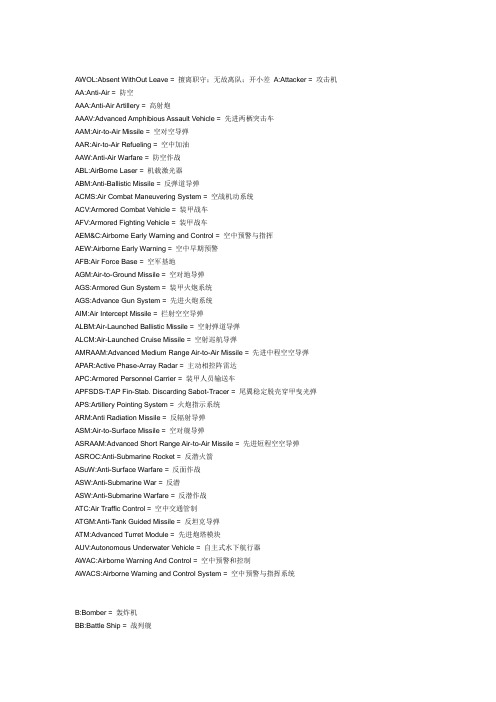
AWOL:Absent WithOut Leave = 擅离职守;无故离队;开小差A:Attacker = 攻击机AA:Anti-Air = 防空AAA:Anti-Air Artillery = 高射炮AAAV:Advanced Amphibious Assault Vehicle = 先进两栖突击车AAM:Air-to-Air Missile = 空对空导弹AAR:Air-to-Air Refueling = 空中加油AAW:Anti-Air Warfare = 防空作战ABL:AirBorne Laser = 机载激光器ABM:Anti-Ballistic Missile = 反弹道导弹ACMS:Air Combat Maneuvering System = 空战机动系统ACV:Armored Combat Vehicle = 装甲战车AFV:Armored Fighting Vehicle = 装甲战车AEM&C:Airborne Early Warning and Control = 空中预警与指挥AEW:Airborne Early Warning = 空中早期预警AFB:Air Force Base = 空军基地AGM:Air-to-Ground Missile = 空对地导弹AGS:Armored Gun System = 装甲火炮系统AGS:Advance Gun System = 先进火炮系统AIM:Air Intercept Missile = 拦射空空导弹ALBM:Air-Launched Ballistic Missile = 空射弹道导弹ALCM:Air-Launched Cruise Missile = 空射巡航导弹AMRAAM:Advanced Medium Range Air-to-Air Missile = 先进中程空空导弹APAR:Active Phase-Array Radar = 主动相控阵雷达APC:Armored Personnel Carrier = 装甲人员输送车APFSDS-T:AP Fin-Stab. Discarding Sabot-Tracer = 尾翼稳定脱壳穿甲曳光弹APS:Artillery Pointing System = 火炮指示系统ARM:Anti Radiation Missile = 反辐射导弹ASM:Air-to-Surface Missile = 空对舰导弹ASRAAM:Advanced Short Range Air-to-Air Missile = 先进短程空空导弹ASROC:Anti-Submarine Rocket = 反潜火箭ASuW:Anti-Surface Warfare = 反面作战ASW:Anti-Submarine War = 反潜ASW:Anti-Submarine Warfare = 反潜作战ATC:Air Traffic Control = 空中交通管制ATGM:Anti-Tank Guided Missile = 反坦克导弹ATM:Advanced Turret Module = 先进炮塔模块AUV:Autonomous Underwater Vehicle = 自主式水下航行器AWAC:Airborne Warning And Control = 空中预警和控制AWACS:Airborne Warning and Control System = 空中预警与指挥系统B:Bomber = 轰炸机BB:Battle Ship = 战列舰BC:Battle Cruiser = 战列巡洋舰BDA:Battle Damage Assessment = 战斗损害评估BPI:Boost Phase Intercept = 加速阶段拦截BRAA:Bearing, Range, Altitude and Aspect = 目标飞行情况BVR:Beyond Visual Range = 超视距BVRAAM:Beyond Visual Range Air-to-Air Missile = 超视距空空导弹C:Carrier = 运输机C3:Command, Control and Communication = 指挥控制通信系统CAP:Combat Air Patrol = 战斗空中巡逻CAS:Close Air Support = 近距空中支援CASE:Computer Aided Software Engineering = 电脑辅助软件工程CBU:Clustered Bomb Unit = 集束炸弹CENTCOM:Central Command = 中央司令部CFC:Carbon Fiber Composite = 碳纤维复合材料CC:Cruiser = 巡洋舰CG:Cruiser (Guided-missile) = 导弹巡洋舰CIC:Combat Information Center = 战斗信息中心CIC:Commander in Chief = 最高指挥官CIWS:Close-In Weapon System = 近战武器系统CIWS:Close Intercept Weapon System = 近程防御系统CNO:Chief of Naval Operation = 海军作战部长COMINT:Communication Intelligence = 通信情报COMDAC INS:Command Display and Control Integrated Navigation System = 集成控制导航系统CR:Close Range = 近程C/S:Course and Speed = 航向与速度CV:Carrier Vessel = 常规动力航空母舰CVN:Carrier Vessel (Nuclear-powered) = 核动力航母CVBG:Carrier Battle Group = 航母战斗群DASS:Defensive Aids Sub-System = 防御性辅助子系统DD:Destroyer = 驱逐舰DDG:Destroyer (Guided-missile) = 导弹驱逐舰DU:Depleted Uranium = 贫铀DVI:Direct Voice Input = 直接语音输入技术E:Electronic = 电子战机ECCM:Electronic Counter-Counter Measures = 电子反对抗,反电子战ECM:Electronic Counter Measures = 电子对抗,电子战ELINT:Electronic Intelligence = 电子情报EMCON:Emissions Control = 发射控制EML:ElectricMagnet Launcher = 电磁炮EMP:ElectricMagnet Palse = 电磁脉冲ERAAM:Extended Range Air-to-Air Missile = 延程空空导弹ESM:Electronic Signal Measures = 电子信号警告ESM:Electronic Support Measures = 电子支援ETG:Electro Thermal Gun = 电热炮ETCG:Electro Thermal Chemical Gun = 电热化学炮EW:Early Warning = 预警EW:Electronic Warfare = 电子战EWAC:Early Warning And Control= 预警及控制F:Fighter = 战斗机FAE:Fuel Air Explosive = 油气炸弹FEL:Free Elctron Laser = 自由电子激光器FF:Frigate = 护卫舰FFG:Frigate(Guided-missile) = 导弹护卫舰FLIR:Forward Looking Infra-Red = 前视红外FLOT:Forward Line Of Troops = 前线FMRAAM:Future Medium Range Air-to-Air Missile = 未来中程空空导弹FMTV:Family of Medium Tactical Vehicles = 中型战术车族GEM:Guidance-Enhanced Missile = 制导增强导弹GEO:Geo-Stationary Orbit = 地球同步轨道GPS:Global Positioning System = 全球定位系统GZ:Ground Zero = 核爆炸中心地面投影H:Helicopter = 直升机HE:High Explosive = 高爆炸药HEAT:High-Explosive Anti-Tank = 高爆反坦克炸药(成形炸药)HMD:Helmet Mounted Display = 头盔显示器HPM:High Power Microwave = 高功率微波HQ:Headquarters = 总部HUD:Head-Up Display = 抬头显示器HVU:High Value Unit = 高价值单位IADS:Integrated Air Defense System = 综合防空系统ICBM:Intercontinental Ballistic Missile = 洲际弹道导弹IFF:Identification of Friend or Foe = 敌我识别IFV:nfantry Fighting Vehicle = 步兵战车IPE:Individual Protection Ensemble = 单兵防护装备IRBM:Intermediate-Range Ballistic Missile = 中程弹道导弹IRST:Infra-Red Search and Track = 红外搜索跟踪JDAM:Joint Direct Attack Munitions = 联合直接攻击弹药JHMCS:Joint Helmet Mounted Cueing System = 联合头盔指引系统JSF:Joint Strike Fighter = 联合打击战斗机J-STAR:Joint Surveillance and Target Attack Radar system = 联合侦察和目标打击系统JTIDS:Joint Tactical Info Distribution System = 联合战术信息分发系统K:Kerosene = 加油机KIA:Kill in Action = 阵亡LANTIRN:Low-Alt. Nav.& Targeting Infra-Red for Night = 低空导航与目标指示红外夜视仪LAV:Light Armored Vehicle = 轻型装甲车辆LCA:Light Combat Aircraft = 轻型战斗机LEO:Low Earth Orbit = 近地轨道LD:Laser Designator = 激光导引LGB:Laser Guided Bomb = 激光制导炸弹LORCAP:Long-Range Combat Air Patrol = 长距离战斗空中巡逻LPT:Low Profile Turret = 低矮炮塔LRBM:Long-Range Ballistic Missile = 远程弹道导弹LRIP:Low Rate Initial Production = 低速试产MBT:Main Battle Tank = 主战坦克MC:Marine Corps = 海军陆战队MCA:Medium Combat Aircraft = 中型战斗机MCM:Mine Counter-Measures = 扫雷MFD:Multi-Function Display = 多功能显示器MFR:Multifunction Radar = 多用途雷达MIL-STD:Milliraty Standard = 军事标准MLU:Mid-Life Update = 中期延寿(战机)MOPP:Mission-Oriented Protective Posture = 攻击中的防范状态MOAB:Massive Ordnance Air Blast = 巨型空中炸弹MOAB:Mother Of All Bombs = 炸弹之母MPRF:Medium Pulse Repetition Frequency = 中脉冲重复频率MRLS:Multiple Rocket Launching System = 多管火箭发射系统NAVSSI:Navigation Sensor System Interface = 导航传感器系统界面NCTR:NonCooperative Target Recognition = 非己方目标识别NBC:Nuclear Biological and Chemical = 核、生物、化学OICW:Objective Individual Combat Weapon = 目标单兵战斗武器OOB:Order Of Battle = 战斗序列OPCW:Org. for the Prohibition of Chemical Weapons = 禁止化学武器组织OTH:Over the Horizon = 超视距OWS:Overhead Weapon System = 遥控炮塔P:Patrol = 巡逻机PA:Phase Array = 相控阵PAC:Patriot Advanced Capability = 改进型爱国者导弹PGM:Precision-Guided Munitions = 精确制导炸弹PIM:Path of Intended Motion = 预定机动路线PK:Probability of Kill = 杀伤率PLGR:Precision Lightweight GPS Receiver = 精确轻型GPS接收器R:Reconnaissance = 侦察机RATO:Rocket Assisted Take-Off = 火箭辅助起飞RCS:Radar Cross Section = 雷达截面RLG:Retractable Landing Gear = 回收式起落架ROE:Rules of Engagement = 交战规则ROV:Remote Operated Vehicle = 遥控车辆、飞机RPG:Rocket Propelled Grenade = 火箭助推榴弹RTB:Return To Base = 返回基地RTO:Ready to Take-Off = 起飞准备就绪RWR:Radar Warning Receiver = 雷达告警器SAM:Surface to Air Missile = 防空导弹SAR:Search and Rescue = 搜索救援SAR:Synthetic Aperture Radar = 合成孔径雷达SATCOM:Satellite Communication = 卫星通信SDV:Swimmer Delivery Vehicle = 潜水员输送载具SEAD:Suppression of Enemy Air Defense = 压制敌方防空任务SLBM:Submarine-Launched Ballistic Missile = 潜射弹道导弹SLGR:Small Lightweight GPS Receiver = 小型轻便GPS接收器SOP:Standard Operation Procedure = 标准操作程序SRBM:Short-Range Ballistic Missile = 近程弹道导弹SSBN:Ballistic-missile Nuclear-powered Strategic Sub. = 战略导弹核潜艇SSL:Solid State Lasers = 固态激光器SSM:Surface-to-Surface Missile = 面对面导弹SSN:Strike Submarine (Nuclear-powered) = 攻击型核潜艇SSNDS:SSN Direct Support = 直接支援核潜艇SSPK:Single-Shot Probability of Kill = 单发杀伤率START:Strategic Arms Reduction Treaty = 战略武器削减条约STK:Strike = 袭击STN:Satellite Tracking Network = 卫星跟踪网STOL:Short Take Off and Landing = 短距起降STOP:Simultaneous Time on Top = 同时到达SURTASS:SURface Towed Array Sonar System = 水面拖曳阵列声纳系统TASM:Tomahawk Anti-Ship Missile = 战斧反舰导弹TEL:Transporter/Erector/Launcher = 运输/起竖/发射车THAAD:Theater High Altitude Area Defense = 战区高空区域防空TLAM:Tomahawk Land Attack Missile = 战斧对地攻击导弹TMA:Target Motion Analysis = 目标运动分析TOW:Tube-launched Optic-tracked Wire-guided = 光学有线制导管内发射反坦克导弹(陶式导弹)TVC:Thrust Vector Converter = 矢量推力UAV:Unmanned Air Vehicle = 无人驾驶飞行器UCAV:Unmanned Combat Air Vehicle = 无人驾驶战斗机UFCP:Up Front Control Panel =(战机座舱)前部控制屏UUV:Unmanned Underwater Vehicle = 无人水下航行器VL:Verticle Landing = 垂直起降VLS:Vertical Launch System = 垂直发射系统VTOL:Vertical Take Off and Landing = 垂直起降WECDIS:Warship Electronic Chart Display and Information Systems = 海图显示和信息系统WRM:War Reserve Materials = 战争物资储备W/S:Weapon System = 武器系统WYPT:Waypoint = 路径点A,是空中(机载),I是对空,M是导弹,AIM就是空对空导弹了。
军事英语翻译词汇

军事词汇导弹missil es洲际导弹intercontin ental missil e中程导弹mediurn-range missil e巡航导弹cruise mi ssil e核弹头nuclea rwerh ead地对地导弹surface to-surface missil e地对空导弹surface-to-air missil e舰对空导弹ship-to-air missil e空对空导弹air-to-air missil e空对地导弹air-to-surface missil e反幅射导弹anti-radiati on missil e反舰导弹anti-ship missil e反潜导弹anti-submari ne missil e自导鱼雷homing torpad o弹翼missil e wing减速伞drag parach ute制导装置guidan ce device弹体guided missil e doby固体火箭发动机solidpropel lant rocket 尾翼tail fin飞行弹道trajectory发射制导装置launchi ng guidan ce device 发射管launchi ng tube反弹道导弹anti-ballis ti c missil e集束炸弹bomb-cluste r地下井missil e silo移动式井盖slidin g silo door火箭发射场rocket launchi ng site发射塔launchi ng tower勤务塔servic e tower核武器nuclea r weapon s燃料库fuel depot; fuel reserv oir指挥室comman d post通气道air vent; ventil ation shaft多级火箭multis tage rocket再入大气层飞行器re-entryvehicl e原子弹atomic bomb氢弹hydrog en bomb引爆装置ignite r热核燃料fusion ablemateri al蘑菇状烟云mushro om cloud冲击波shock wave; blast wave放射性落下灰尘radioa ctive fallou t核爆炸观测仪nuclea r explosi on observ ation device辐射仪radiati on gauge辐射级仪radiati on leveli ndica tor军事卫星milita ry satell i te侦察卫星reconn aissa nce satell ite预警卫星earlywarnin g satell ite电子侦察卫星electroni creconn ai ssa n ce satell ite导航卫星naviga tionsatell ite测地卫星geodesi c satell ite军用通讯卫星milita ry communi cati ons satell ite军用气象卫星milita ry meteorologi c al satell ite卫星通信车satell i te communi cati ons vehicl e宇宙空间站spacestatio n警戒雷达warnin g radar引导雷达direct or radar制导雷达guidan ce radar目标指示雷达target radar测高雷达height findin g radar三坐标雷达three-dimensi onal radar弹道导弹预警相控阵雷达ballis tic missil e early-warnin g phased-arrayradar导航雷达naviga tionradar机载截击雷达airborne intercept radar炮瞄雷达gun-pointi ng radar对空警戒雷达aircra ft-warnin g radar航海雷达marine radar对海管戒雷达naval warnin g radar侦察雷达reconn aissa nce radar卫星通信天线satell ite communi cati on antena驱逐舰destro yer歼击机fighte r plane; fighte r空速管airspe ed head; pilottube陀螺gyroscope无线电罗盘radiocompas s平视显示机head-up displa y火箭弹射座椅ejecto r seat副翼ailero n襟翼flap燃油箱fuel tank垂直尾翼tail fin; vertical stabil izer阻力伞舱drag parach ute housin g水平尾翼horizo ntal stabil izer液压油箱hydrau li c oil contai ner副油箱auxili ary fuel tank主起落架main landin g gear机翼整体油箱integral wing tank机炮machin e gun; cnnon进气道系统air-inletsystem前起落架frontl andin g gear空气数据计算机air-data comput er迎角传感器angleof attack sensor进气口头锥air-inletnose cone战斗机combat aircra ft截击机interceptor强击机attack er歼击轰炸机fighte r-bomber轻型轰炸机light bomber战略轰炸机strate gic bomber电子战机electroni cfighte r高速侦察机high-speedreconn ai ssa n ce plane空中加油机tanker ai rcra ft运输机transp ort plane; air-freigh ter水上飞机seapla ne; hydroplane反潜巡逻机anti-submari ne patrol aircra ft教练机traine r aircra ft; traine r垂直起落飞机vertic al take-off and landin g无尾飞机taille ss aircra ft隐形轰炸机stealt h bomber可变翼机adjust able wing plane动力滑翔机power glider扫雷直升机mine-sweepi ng helico pter旋翼rotor机身fusela ge抗扭螺旋桨anti-torque tail rotor航空炸弹aerobo mb钢珠弹bomb with steel balls; contai ner bomb unit 化学炸弹chemic al bomb主战坦克capita l tank重型坦克heavytank中型坦克medium tank轻型坦克lighttank水陆两用坦克amphib i ous tank喷火坦克flame-throwi ng tank架桥坦克bridge tank扫雷坦克mine-sweepi ng tank坦克推土机tankdo zer侦察坦克reconn aissa nce tank无炮塔坦克turretless tank坦克牵引车recove ry tank坦克修理后送车repair-servic e tank反坦克障碍物anti-tank obstacl e桩寨pile stocka de鹿寨abatis反坦克断崖anti-tank ditch反坦克崖壁anti-tank precip i ce反坦克三角锥anti-tank pyrami ds炮手gunner坦克兵tank soldie r炮口muzzle炮管barrel清烟器fume extrac tor炮塔turret瞄准镜gun sight发动机散热窗radiat or grille备用油箱reserv e fuel tank主动轮drivin g wheel遮护板shield负重轮loadin g wheel烟幕弹发射筒smokebomb discha rger诱导轮induce r潜望镜periscope鱼雷torped oes电动机鱼雷electri c torped o航空鱼雷aerial torped o火箭助飞鱼雷rocket-assist ed torped o线导鱼雷wire-guided torped o发射机transm i tter自导控制组件self-directi ng unit装药和电子组件charge and electron unit 待发装置actuat or指令控制组件comman d contro l unit陀螺控制组件gyro-contro l unit电源控制组件power-supply contro l unit 燃烧室combustor舵rudder推进器propel ler潜艇submari ne鱼雷舱torped o room鱼雷发射管fi ring tube声纳sonar操纵线contro l wire水雷submari ne mine自航式水雷mobile mine锚雷moorin g mine触发锚雷moored contact mine触角antenna雷索mine-moorin g cable沉底水雷ground mine漂雷floati ng mine深水炸弹depth charge; depthbomb航空母舰aircra ft carrie r核动力航空母舰nuclea r-powere d aircra ft 阻拦装置arrest er飞行甲板flight deck雷达天线radar antenn a导航室island舰桥bridge机库hangar升降机口aircra ft lifts; elevat ors舰载机起飞弹射装置catapul ts油料舱fuel bunker弹药舱ammuni tion store贮存舱storag e hold通信中心室communi cati on center核反应堆nuclea r reacto r生活舱accomm odati on巡洋舰cruise r护卫舰escort vessel; frigat e导弹护卫舰mi ssil e frigat e战列舰battle ship护卫艇corvet te供应舰tender ship; depot ship舰队补给舰fleet depot ship海上补给船sea depot ship运输舰transp ort ship汽油运输船gasoli ne transp o rt ship扫雷舰mine sweepi ng vessel扫雷艇minesweeper鱼雷艇torped o boat导弹快艇missil e speedb oat导弹潜艇guided-missil e submari ne核动力潜艇nuclea r-powere d submari ne 潜艇救护舰submari ne lifegu ard ship猎潜艇submari ne chaser登陆舰landin g ship坞式登陆舰dock landin g ship电子侦察船electroni creconn ai ssa n ce ship情报收集船inform ation-collectingship测量船survey vessel调查船research ship打捞回收船salvag e vessel核动力破冰船nuclea r-powere d icebre aker气垫巡逻船patrol hoverc raftCarpet Bomb 地毯式轰炸: U.S. planes carpet-bombed Talibanfrontlinesnorthof Kabulon Wednes day and attack ed theMuslim militi a's powerb ase of Kandah ar in southe astAfghan istan, hittin g a clinic.Pullba ck 撤军: Palesti nian s said the pullba ck should be carrie d out uncond ition ally, and the United States keptup its pressu re to end the operat ion, whichis Israel'smost intens ive in 13 months of fighti ng.Pound猛烈轰炸: U.S. airstri kespoundA fghan homes.Cybert errori sm 网络恐怖主义:Presid ent formsCybert errori sm panel.Anthra x炭疽: Anthra x in Florid a, whichU S Attorn eyGenera l John Ashcro ft said was beingtreate d "veryseriou sly," amid concer ns over a possib le bioter roris tattack.milita ry buildu p 军事集结: The United States has sent some 1,000 soldie rs to Uzbeki stanas part of its bigges tmilita ry buildu p sincethe 1991 Gulf War.terrori st mastermind恐怖大亨: The country's ruling Taliban militi a declar ed the assaul t a ``terror ist attack'' andsaid allege d terror ist master mindOsamabin LadenandTaliba n leader Mullah Momamm ed Omar had surviv ed.pay a price付出代价: "Now the Taliban will pay a price,"Bush vowed.hit target s 攻击目标:U.S. and British forces hit target s in at leastthreecities.launch strike s 发动进攻:U.S. and Britai n has launch ed Afghan strike s.warpla ne, milita ry aircra ft 军用飞机:Missil es and warpla nes streak ed throug h the Afghan nightand rocked at leastthreecities in a U.S.-Britis hattack on Osamabin Ladenand his Taliba n backer sSunday.Defens e Secret ary Donald H. Rumsfe ld said an initia lgoal of the strike s was to render air defens esineffe ctive and to wipe out the Taliba n's milita ryaircra ft.cruise mi ssil es 巡航导弹:Pentag on offici als said the United States and Britai n launch ed 50 cruise missil es agains ttarget s inside Afghan istan in an attack that alsoinvolv ed the most sophis ticat ed U.S. warpla nes.milita ry capabi litie s 军事能力:Presid ent Bush gave a live televi sed addres s afterthe strike s began, saying U.S.and Britis h forces were taking ``target ed action s''agains t Taliba n milita ry capabi litie s and al-Qaida.hand over 交出:In the days followi ng the strike s at theWorldTradeCenter and Pentag on, the presid ent hadissued a series of demand s for the Taliba n to hand overbin Laden.fortifi cati on 防御工事:The head of an Afghan opposi tiongroupoffice in Iran said more than 200 U.S. and Britis hmissil es hit Afghan istan and ``devast ated'' Taliba n'sfortif icati ons in Kandah ar, Kabuland Mazar-e-Sharif.infidel异教徒:Later, Taliba n Deputy Defense Minister Mullah Noor Ali said ''the people of Afghan istan willresist. They will neveraccept the rule of infide ls.''jihad圣战(伊斯兰教徒对异教徒的战争):The influe ntial and Taliba n-sympat hetic Afghan Defens e Counci l, basedin theeaster n Pakist ani city of Lahore, issued a call for"jihad,'' or holy war.air base 空军基地:Shortl y before the U.S. strike s began, the Taliba n had said they had sent thousa nds of troops tothe border with Uzbeki stan, whosepresid ent has allowe dU.S. troops use of an air base for the anti-terror ismcampai gn.strong hold要塞据点:But the Taliba n strong holdof Kandahar - alread y a shabby city of rocket-gouged street s andbullet-scarre d homes.refuel ing stop 补给站:The first was a punishi ng attack onthe airpor t, whichwas builtby the United States as arefuel ing stop betwee n Europe and Indiabefore thelong-haul Boeing 747s were introd uced.on conditi on of anonymi ty 匿名:The assaul t on the southe rn Afghan city came in at leastthreewaves, accord ing toTaliba n source s who spoketo The Associ atedPressbyteleph one on condit ion of anonym ity.armada舰队:FortyU.S. and Britis h warpla nes and an armada of warshi ps and submar inespummel ed strong holds of theal-Qaidanetwor k and the Taliba n regime in Afghan istan.firepo wer 火力:The demonstrati on of Western firepo wer was the firstwave of an anti-terror ism campai gn promis edafterthe Sept. 11 attack s on the United States.cargoplanes运输机:U.S. Air ForceC-17 cargoplanes flying from Ramste in Air Base, German y, were droppi ng food andmedica l suppli es inside Afghan istan as part of Presid entBush 's effort to aid displa ced civili ans.carrie r 航空母舰:A senior defense offici al, speaki ng oncondit ion of anonym ity, said laterthat Navy F/A-18 andF-14 fighte rs flew missio ns off two U.S. carrie rs in theArabia n Sea, and that no land-basedAir Forcestrikeplanes otherthan bomber s were used in the firstroundof attack s.blitz闪电战(尤指空袭):Britai n joined U.S.-led attack s on Afghan istan, usingsubmar inesto launch a cruise missil eblitzagains t Osamabin Ladenand his Taliba nprotec tors.Tomaha wk 战斧式巡航导弹:The naval task forces includ e warsh i pscapabl e of firing Tomaha wk cruise missil es, whichwerelast used in Afghan istan in 1998 agains t bin Ladentraini ng campsin a failed bid to kill the exiledSaudi-born millio naire and his lieute nants.Tomcat美国航母F-14野猫战斗机:Two US Navy airmen were killed whentheirF-14 "Tomcat" aircra ft crashe d the day beforeyester day during a landin g manoeu vre at an air show atWillow GroveUS NavalAir Statio n, an annual eventattend ed by 200,000 people, a Navy spokes woman said.neutra l country中立国:The Taliba n insisted they wouldnot be bullie d into handin g over bin Laden, but said hecouldbe givento a neutra l countr y if Washin gtonprovid ed eviden ce linkin g him to last month's suicid eplaneattack s.air raid 空袭:The air raidshave sparke d an exodus ofpeople from cities -- many headin g toward Pakist an withbelong ingspiledhastil y onto donkey s and camels.stripthe citize nship取消国籍:Kuwait decide d Sunday to stripthe citize nship of the spokes man who appear ed inthe tapes, Sulaim an Abu Ghaith, a former Kuwait iteache r.all-out attack全面进攻:The United States and its partne rs have been urging the opposi tionto avoidlaunch ing anall-out attack on Kabuluntila broad-basedgovern mentcan be formed to replac e the Taliba n.extrem i st 极端分子:On Sunday, thousa nds of Muslim extrem i stsconver ged on the city of Jacoba bad, site of one of twoairfie lds that Pakist ani offici als privat ely say theAmeric ans have been allowe d to use to suppor t thecampai gn, though not to launch attack s on Afghan istan.shrapnel流霰弹:He said a bomb or missil e had explod edn earby and shrapn el landed on his house.comman do 突击队:Taliba n's troops hit as allies plan for comman do raids.军衔中英对照陆军Army一级上将Genera l First上将Genera l中将Lieute nant Genera l少将MajorGenera l大校Senior Colonel上校Colonel中校Lieute nant Colonel少校Major上尉Captai n中尉First Lieute nant少尉Second Lieute nant军事长Master Sergea nt专业军士Special i st Sergea nt上士Sergea nt, First Class中士Sergea nt下士Corporal上等兵Pri vate, First Class列兵Privat e海军Navy一级上将Admiral, First Class上将Admiral中将V ice Admiral少将Rear Admiral大校Senior Captai n上校Captai n中校Comman der少校Lieute nant Comman der上尉Lieute nant中尉Lieute nant, Junior Grade少尉Ensign军事长ChiefPettyOffi ce r专业军士Specia l ist PettyOffice r 上士PettyO ffice r, FirstClass中士PettyO ffice r, Second Class下士PettyO ffice r, ThirdClass上等兵Seaman, FirstClass列兵Seaman, Second Class空军AirForce一级上将Genera l, FirstClass上将Genera l中将Lieute nant Genera l少将MajorGenera l大校Senior Colonel上校Colonel中校Lieute nant Colonel少校Major上尉Captai n中尉First Lieute nant少尉Second Lieute nant军事长Master Sergea nt专业军士Specia l ist Sergea nt上士Techni c al Sergea nt中士Staff Sergea nt下士Corporal上等兵Airman, First Class列兵Airman, Second Class。
大学《军事理论》考试试题及答案
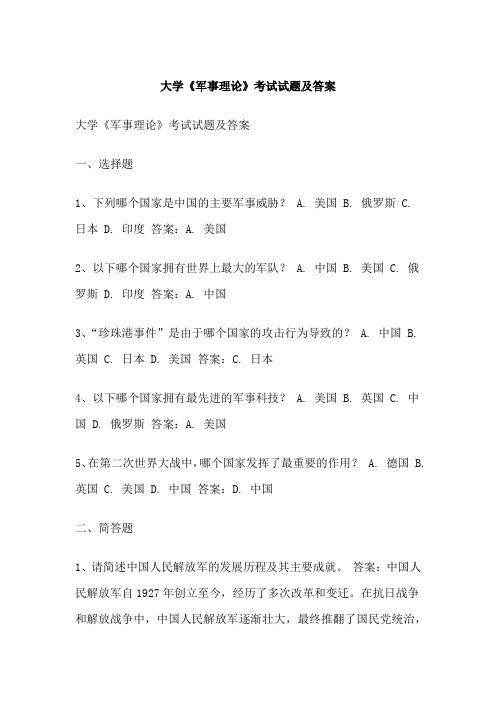
大学《军事理论》考试试题及答案大学《军事理论》考试试题及答案一、选择题1、下列哪个国家是中国的主要军事威胁? A. 美国 B. 俄罗斯 C.日本 D. 印度答案:A. 美国2、以下哪个国家拥有世界上最大的军队? A. 中国 B. 美国 C. 俄罗斯 D. 印度答案:A. 中国3、“珍珠港事件”是由于哪个国家的攻击行为导致的? A. 中国 B. 英国 C. 日本 D. 美国答案:C. 日本4、以下哪个国家拥有最先进的军事科技? A. 美国 B. 英国 C. 中国 D. 俄罗斯答案:A. 美国5、在第二次世界大战中,哪个国家发挥了最重要的作用? A. 德国 B. 英国 C. 美国 D. 中国答案:D. 中国二、简答题1、请简述中国人民解放军的发展历程及其主要成就。
答案:中国人民解放军自1927年创立至今,经历了多次改革和变迁。
在抗日战争和解放战争中,中国人民解放军逐渐壮大,最终推翻了国民党统治,建立了新中国。
新中国成立后,中国人民解放军不断加强自身建设,积极参与国际反恐、维和等活动,取得了显著成就。
例如,在抗美援朝战争中,中国人民解放军成功阻止了美国对朝鲜的进攻,保卫了新中国的安全。
此外,中国人民解放军还参与了多次边境防御作战,为维护国家主权和领土完整做出了重要贡献。
2、请简述核武器对世界格局的影响。
答案:核武器的出现极大地改变了世界格局。
核武器具有极大的破坏力和威慑力,使得有核国家具备了互相制衡的能力,形成了相对平衡的局势。
同时,核武器也使得战争的代价变得极其高昂,促使各国在处理国际关系时更加谨慎和理智。
此外,核武器还推动了全球反对核扩散的浪潮,防止核武器进一步扩散。
3、请简述抗日战争对中国的影响。
答案:抗日战争是中国历史上的一件大事,对中国的影响极为深远。
在战争中,中国付出了巨大的民族牺牲,为反法西斯战争作出了巨大贡献。
抗日战争也促进了中国民族意识的觉醒,加速了中国民主革命的进程。
此外,抗日战争还为中国带来了巨大的精神财富,激发了中华民族的凝聚力和爱国精神。
军事英语词汇

军事英文军:Army;师:division;旅:brigade;团:regiment/corps;营:battalion;连:company;排:platoon;班:squad。
陆军Army一级上将General First上将General中将Lieutenant General少将Major General大校Senior Colonel上校Colonel中校Lieutenant Colonel少校Major上尉Captain中尉First Lieutenant少尉Second Lieutenant军事长Master Sergeant专业军士Specialist Sergeant上士Sergeant, First Class中士Sergeant下士Corporal上等兵Private, First Class列兵Private海军Navy一级上将Admiral, First Class上将Admiral中将Vice Admiral少将Rear Admiral大校Senior Captain上校Captain中校Commander少校Lieutenant Commander上尉Lieutenant中尉Lieutenant, Junior Grade少尉Ensign军事长Chief Petty Officer专业军士Specialist Petty Officer 上士Petty Officer, First Class中士Petty Officer, Second Class 下士Petty Officer, Third Class上等兵Seaman, First Class列兵Seaman, Second Class空军Air Force一级上将General, First Class上将General中将Lieutenant General少将Major General大校Senior Colonel上校Colonel中校Lieutenant Colonel少校Major上尉Captain中尉First Lieutenant少尉Second Lieutenant军事长Master Sergeant专业军士Specialist Sergeant上士Technical Sergeant中士Staff Sergeant下士Corporal上等兵Airman, First Class列兵Airman, Second Class军棋military chess工兵sapper排长platoon commander(中尉lieutenant)连长company commander ( 上尉captain )营长battalion commander (少校major)团长colonel(上校)旅长brigadier (准将)师长division commander军长army commander司令chief commander军旗army flag/ensign地雷landmine炸弹bomb行营field headquarter大本营supreme headquarter和平使命-2009: Peace Mission 2009联合军事演习: joint military drill, joint military exercise, joint military manoeuvre海军海上封锁: naval blockade,maritime blockade隔离作战演练: isolation drill两栖登陆: amphibious landing装备: hardware战舰: military vessel驱逐舰: destroyer护卫舰: frigate登陆艇: landing ship, landing craft潜艇: submarine猎潜艇: submarine hunter反潜舰: anti-submarine vessel海军舰队: naval fleet"沙波什尼科夫海军元帅"号大型反潜舰: submarine-hunting ship Marshall Shaposhnikov武装直升机: armed helicopter战斗机: battle plane轰炸机: bomber, cargo jets运输机: freighter远程预警机: long-range early warning aircraft反潜鱼雷: anti-sub torpedo深水炸弹: depth charge海陆空军: amphibious force水陆坦克: amphibious tank海军陆战队: marine corp炮兵: artillery空降部队: paratroop, airborne troop地面进攻: ground attack特种部队: special taskforce实弹: live ammunition滩头阵地: beachhead潜望镜periscope鱼雷torpedoes电动机鱼雷electric torpedo航空鱼雷aerial torpedo火箭助飞鱼雷rocket-assisted torpedo线导鱼雷wire-guided torpedo发射机transmitter自导控制组件self-directing unit装药和电子组件charge and electron unit待发装置actuator指令控制组件command control unit陀螺控制组件gyro-control unit电源控制组件power-supply control unit燃烧室combustor舵rudder推进器propeller潜艇submarine鱼雷舱torpedo room鱼雷发射管firing tube声纳sonar操纵线control wire 水雷submarine mine自航式水雷mobile mine锚雷mooring mine触发锚雷moored contact mine触角antenna雷索mine-mooring cable沉底水雷ground mine漂雷floating mine深水炸弹depth charge; depth bomb航空母舰aircraft carrier核动力航空母舰nuclear-powered aircraft 阻拦装置arrester飞行甲板flight deck雷达天线radar antenna导航室island舰桥bridge机库hangar升降机口aircraft lifts; elevators舰载机起飞弹射装置catapults油料舱fuel bunker弹药舱ammunition store贮存舱storage hold通信中心室communication center核反应堆nuclear reactor生活舱accommodation巡洋舰cruiser护卫舰escort vessel; frigate导弹护卫舰missile frigate战列舰battleship护卫艇corvette供应舰tender ship; depot ship舰队补给舰fleet depot ship海上补给船sea depot ship运输舰transport ship汽油运输船gasoline transport ship扫雷舰mine sweeping vessel扫雷艇minesweeper鱼雷艇torpedo boat导弹快艇missile speedboat导弹潜艇guided-missile submarine核动力潜艇nuclear-powered submarine 潜艇救护舰submarine lifeguard ship猎潜艇submarine chaser登陆舰landing ship坞式登陆舰dock landing ship电子侦察船electronic reconnaissance ship 情报收集船information-collecting ship测量船survey vessel调查船research ship打捞回收船salvage vessel核动力破冰船nuclear-powered icebreaker 气垫巡逻船patrol hovercraft导弹军导弹missiles洲际导弹intercontinental missile中程导弹mediurn-range missile巡航导弹cruise missile核弹头nuclearwerhead地对地导弹surface to-surface missile地对空导弹surface-to-air missile战略导弹: strategic missile舰对空导弹ship-to-air missile空对空导弹air-to-air missile空对地导弹air-to-surface missile反幅射导弹anti-radiation missile反舰导弹anti-ship missile反潜导弹anti-submarine missile自导鱼雷homing torpado弹翼missile wing减速伞drag parachute制导装置guidance device弹体guided missile doby固体火箭发动机solid propellant rocket尾翼tail fin飞行弹道trajectory发射制导装置launching guidance device 发射管launching tube反弹道导弹anti-ballistic missile集束炸弹bomb-cluster地下井missile silo移动式井盖sliding silo door火箭发射场rocket launching site发射塔launching tower勤务塔service tower陆军核武器nuclear weapons燃料库fuel depot; fuel reservoir指挥室command post通气道air vent; ventilation shaft多级火箭multistage rocket再入大气层飞行器re-entry vehicle原子弹atomic bomb氢弹hydrogen bomb引爆装置igniter 热核燃料fusionable material蘑菇状烟云mushroom cloud冲击波shock wave; blast wave放射性落下灰尘radioactive fallout核爆炸观测仪nuclear explosion observation device 辐射仪radiation gauge辐射级仪radiation level indicator钢珠弹bomb with steel balls; container bomb unit 化学炸弹chemical bomb主战坦克capital tank重型坦克heavy tank中型坦克medium tank轻型坦克light tank水陆两用坦克amphibious tank喷火坦克flame-throwing tank架桥坦克bridge tank扫雷坦克mine-sweeping tank坦克推土机tankdozer侦察坦克reconnaissance tank无炮塔坦克turretless tank坦克牵引车recovery tank坦克修理后送车repair-service tank反坦克障碍物anti-tank obstacle桩寨pile stockade鹿寨abatis反坦克断崖anti-tank ditch反坦克崖壁anti-tank precipice反坦克三角锥anti-tank pyramids炮手gunner坦克兵tank soldier炮口muzzle炮管barrel清烟器fume extractor炮塔turret瞄准镜gun sight发动机散热窗radiator grille备用油箱reserve fuel tank主动轮driving wheel遮护板shield负重轮loading wheel烟幕弹发射筒smoke bomb discharger诱导轮inducer空军low Earth orbit 近地轨道lunar module 登月舱lunar rover 月球车main landing field/ primary landing site 主着陆场manned space 载人航天计划manned space flight 载人航天manned spaceship/ spacecraft 载人飞船Milky Way 银河系multi-manned and multi-day spaceflight 多人多天太空飞行multistage rocket 多级火箭NASA(The National Aeronautics and Space Administration) 美国航空航天管理局nozzle of the main engine 主发动机喷嘴orbit 轨道orbit the earth 绕地球飞行orbital module 轨道舱emergency oxygen apparatus 应急供氧装置Experimental Spacecraft 试验太空船fine-tune orbit 调整轨道geosynchronous satellite 地球同步人造卫星hatch 舱口Hubble Space Telescope 哈勃太空望远镜International Space Station 国际空间站ladder 扶梯landing area 着陆区landing pad 着陆架launch a satellite 发射卫星launch pad 发射台life support system 生命维持系统LM-maneuvering rockets 登月舱机动火箭Long March II F carrier rocket 长征二号F运载火箭access flap 接口盖antenna 天线Apollo 阿波罗号宇宙飞船ascent stage 上升段astronaut 航天员capsule 太空舱carrier rocket 运载火箭rocket launcher 火箭发射装置;火箭发射器CAST(the Chinese Academy of Space Technology) 中国空间技术研究院CNSA(China National Space Administration)中国航天局command module 指令舱,指挥舱communication satellite 通信卫星descent stage 下降段directional antenna 定向天线outer space; deep space 外太空payload capability 有效载荷能力propelling module 推进舱recoverable satellite 返回式卫星re-entry module 返回舱remote sensing satellite 遥感卫星satellite in Sun-synchronous orbit 太阳同步轨道卫星second stage 第二级service module 服务舱Shenzhou VI spacecraft 神舟六号solar cell 太阳电池solar panel 太阳能电池板space elevator 太空升降舱space food 太空食物space outfits(space suits, gloves, boots, helmet etc.)太空服space physics exploration 空间物理探测space shuttle 航天飞机spacecraft 航天器Telstar 通讯卫星third stage 第三级unmanned spaceship / spacecraft 无人飞船weather satellite 气象卫星launch a satellite 发射卫星artificial satellite 人造卫星airliner 班机monoplane 单翼飞机glider 滑翔机trainer aircraft 教练机passenger plane 客机propeller-driven aircraft 螺旋桨飞机jet (aircraft) 喷射飞机amphibian 水陆两用飞机seaplane, hydroplane 水上飞机turbofan jet 涡轮风扇飞机turboprop 涡轮螺旋桨飞机turbojet 涡轮喷射飞机transport plane 运输机helicopter 直升机supersonic 超音速hypersonic 高超音速transonic 跨音速subsonic 亚音速Airbus 空中客车Boeing 波音Concord 协和Ilyusin 依柳辛McDonald-Douglas 麦道Trident 三叉戟Tupolev 图波列夫军事卫星military satellite侦察卫星reconnaissance satellite预警卫星early warning satellite电子侦察卫星electronic reconnaissance satellite导航卫星navigation satellite测地卫星geodesic satellite军用通讯卫星military communications satellite军用气象卫星military meteorological satellite卫星通信车satellite communications vehicle宇宙空间站space station警戒雷达warning radar引导雷达director radar制导雷达guidance radar目标指示雷达target radar测高雷达height finding radar三坐标雷达three-dimensional radar弹道导弹预警相控阵雷达ballistic missile early-warning phased-array radar导航雷达navigation radar机载截击雷达airborne intercept radar炮瞄雷达gun-pointing radar对空警戒雷达aircraft-warning radar航海雷达marine radar对海管戒雷达naval warning radar侦察雷达reconnaissance radar卫星通信天线satellite communication antena驱逐舰destroyer歼击机fighter plane; fighter空速管airspeed head; pilot tube陀螺gyroscope无线电罗盘radio compass平视显示机head-up display火箭弹射座椅ejector seat副翼aileron襟翼flap燃油箱fuel tank垂直尾翼tail fin; vertical stabilizer阻力伞舱drag parachute housing水平尾翼horizontal stabilizer液压油箱hydraulic oil container副油箱auxiliary fuel tank主起落架main landing gear机翼整体油箱integral wing tank机炮machine gun; cnnon进气道系统air-inlet system前起落架front landing gear空气数据计算机air-data computer迎角传感器angle of attack sensor进气口头锥air-inlet nose cone 战斗机combat aircraft截击机interceptor强击机attacker歼击轰炸机fighter-bomber轻型轰炸机light bomber战略轰炸机strategic bomber电子战机electronic fighter高速侦察机high-speed reconnaissance plane空中加油机tanker aircraft运输机transport plane; air-freighter水上飞机seaplane; hydroplane反潜巡逻机anti-submarine patrol aircraft教练机trainer aircraft; trainer垂直起落飞机vertical take-off and landing无尾飞机tailless aircraft隐形轰炸机stealth bomber可变翼机adjustable wing plane动力滑翔机power glider扫雷直升机mine-sweeping helicopter旋翼rotor机身fuselage抗扭螺旋桨anti-torque tail rotor航空炸弹aerobomblight water 轻水light water reactor (LWR) 轻水反应堆limited nuclear option 有限的核被选方案Long March 2E rocket with strap-on boosters [PRC] 长征二E捆绑火箭[中国]long-range ballistic missile (LRBM) 远程弹道导弹low earth orbit (LEO) 卫星低轨道;近地卫星low frequency (LF) 低频low level missile target drone 低空导弹目标声low-enriched uranium 低浓缩铀maneuverable reentry vehicle (MARV) 可操纵返航运载工具marine corps 登陆队;陆战队maritime rights 海洋权materials test reactor 物质试验反应堆material unaccounted-for (MUF) 材料损失Maverick air-to-surface missile [US] 小牛空对地导弹[美国] maximum range 最大射程measurement and control 测控mechanized 机械化mediate 调停medium-range ballistic missile (MRBM) 中程弹道导弹mid-course guidance 飞行中段制导military bloc 军事集团military hardware 武器装备military spending 军事开支; 军费military use 军用military-industrial complex (MIC) 军事工业复合体mine detector 探雷器minelaying machine; minelayer 布雷器mini-nuke 小型核武器missile fast attack craft 导弹快艇missile silo 导弹地下发射井mixed-oxide fuel 混氧燃料mobile formation 机动编队mobile missile 机动导弹moderator 减速器moon craft 月球探测机multilateral disarmament 多边裁军multinational technical means 多国技术手段multiple independently targeted re-entry vehicle (MIRV) 多弹头分导再入飞行器multiple protective shelter (MPS) 多重保护壳multiple reentry vehicle (MRV) 多弹头返航运载工具multiple rocket launcher (MRL) 多管火箭炮multiple-launcher rocket system 多管火箭系统multiple-tube rocket gun 多管火箭炮multiple-warhead missile 多弹头导弹multipolarity 多级化mutual non-aggression 互不侵犯mutual non-interference 互不干涉national defense 国防national security 国家安全national sovereignty 国家主权national technical means 国家技术手段natural uranium 天然铀naval aviation corps 海军航空兵部队naval space surveillance (NA VSPASUR) 海军空间监测NBC protective clothing 三防服near-site verification 近场核查negative security assurance 消极安全保证neutron 中子neutron bomb 中子弹no first use 不首先使用nominal weapon 低威力核武器(2万吨级以下)non-interference in each other's internal affairs 互不干涉内政non-nuclear weapon states (NNWS) 非核武器国家non-proliferation 不扩散non-proliferation policy 不扩散政策non-use assurance 不使用核武器保证nuclear air-burst 空中核爆炸nuclear attack submarine 核动力攻击潜艇nuclear deterrent 核威慑力量nuclear device 核装置nuclear doctrine 核条令nuclear fuel 核燃料nuclear fuel cycle capacities 核燃料循环容量nuclear proliferation 核扩散nuclear radiation 核辐射nuclear reactor 核反应堆nuclear stockpile 核武器储备nuclear testing 核试验nuclear weapon states (NWS) 核武器国nuclear weapon-free zone 无核区nuclear yield 核当量nuclear, biological, and chemical weapons/warfare (NBC) 核,生物和化学武器/战争off-line refueling 线外式加燃料off-site monitoring 远距离监视once-through fuel cycle (核)燃料单一循环on-line refueling 线内式加燃料on-site inspection (OSI) 实地核查;现场核查optimum height 最佳高度optimum security threshold 最适当安全门槛orbit 轨道outguessing regress (核打击决策)猜测循环over pressure 超压力over-the-horizon missile attack 超视距导弹攻击pace of proliferation 扩散步幅parameter 参数parity 均势pathfinder 航向指示器Patriot missile 爱国者导弹payload 有效荷载peaceful coexistence 和平共处peaceful nuclear explosion (PNE) 和平用途核爆炸peaceful use 和平利用penetration aids 突防用具perigee 近地点perimeter acquisition radar (PAR) 环形搜索雷达perimeter portal monitoring 进出口周边监视permissive action link 允许行动联系Perry-class guided missile frigate [US] 派里级导弹巡航舰[美国]phased-array radar 相位阵列雷达physical protection (of nuclear materials) 核物质保护pilotless target aircraft 无引行目标飞行器pin-point bombing; precision bombing 定点轰炸planned aggregate yield 计划总当量plutonium fuel cycle 钚燃料循环plutonium production reactor 钚生产反应堆plutonium-239 钚239plutonium-240 钚240point of impact 弹着点polar orbiting geophysical observatory (POGO) 极地轨道地球物理观测卫星polar space launch vehicle (PSLV) 极地空间发射器Polaris missile 北极星导弹Polaris submarine 北极星潜艇positive security assurance 积极安全保证; 肯定句安全保障power politics 强权政治power reactor 动力反应堆precision guided munitions (PGM) 精确导向武器Prithvi guided missile [India] 蟮氐嫉?[印度]production reactor 生产反应堆projectile 射弹propellant 火箭推进剂propelled rocket ascent mine (PRAM) 动力式火箭助生水雷proton 质子pursuit 追击radar cross-section 雷达有效区radar intelligence (RADINT) 雷达情报radar ocean reconnaissance satellite 雷达海洋侦察卫星radioisotope 放射性同位素radius of action 活动半径Rafale fighter[France] 飚风战斗机[法国]ramjet 冲压式喷气发动机range 距离; 射程range finder 测距仪rapprochement 解冻ratification 批准; 认可reactor core 反应堆芯reactor-grade plutonium 反应堆级钚reconnaissance 侦察recycled nuclear fuel 再生核燃料; 回收核燃料red fuming nitric acid (RFNA) 浓硝酸(发红烟硝酸)reduced blast (enhanced radiation) 弱冲击波(强辐射)reentry vehicle (RV) 重返大气层飞行器reflective particle tag (R&D by Sandia Lab) 发射粒子标签(Sandia 实验室研制)refueling (再) 加燃料regime 政体regional disarmament 区域裁军reliability (e.g., of nuclear weapons) 可靠性remotely-piloted vehicle 遥控飞行器remote sensing technology 遥感技术render-safe experiments 原始核装置拆卸的安全reprocessing (of plutonium) (钚)再处理research and development (R&D) 研究与发展research reactor 研究反应堆residual radiation 剩余(原子核) 辐射retaliation 报复ricin (WA) 蓖麻毒素rocket 火箭rocket engine 火箭发动机roll and yaw departure 侧滚脱离外加偏航脱离routine inspection 例行视察safeguarded facility 受保障监督的设施safeguards 保障监督satellite (space) launch vehicle 卫星发射器(空间运载火箭) satellite data system 卫星数据系统satellite defense 卫星防御satellite inspector system 卫星监视器系统sea cobra helicopter 海眼镜蛇直升飞机sea knight helicopter 海武士直升飞机sea stallion helicopter 海种马直升飞机second strike 核反击security dilemma 安全困境;安全两难security guarantees 安全保证self-defense 自卫semi-synchronous orbit 卫星半同步轨道sense and destroy armor (SADARM) 反装甲弹sensitive materials 敏感物质short-range attack missile 近程攻击导弹short-range ballistic missile (SRBM) 短程弹道导弹Shrike antiradar air-to-surface missile [USA] 百舌鸟空对地反雷达导弹[美国]Sidewinder air-to-air missile [US] 响尾蛇空对空导弹[美国] sighting device 瞄准器signals intelligence (SIGINT) 信号情报Silkworm missile series (short/medium-range coastal defense missile) 蚕式飞弹系列(近/中程海防飞弹)silo 发射井simulation (e.g., nuclear test) 模拟single integrated operational plan (SIOP) 统一攻击目标计划single-role mine hunter (SRMH) 单一任务猎雷舰smooth-bore gun 滑堂炮sortie 飞机架次sound surveillance system (SOSUS) 声响监测系统space-based 天基space-based interceptor 太空截击体space detection and tracking system (SPADATS) 空间探测与跟踪系统space mine 天雷special inspections 特别视察;专门视察spent fuel 乏燃料spent fuel rods 乏燃料棒spent fuel storage 乏燃料储存splash down ?q辅staphylococcal entotoxin 葡萄球菌毒素Sting missile [USA] 刺针飞弹[美国]stockpile 储存; 储备strategic forces 战略部队strategic nuclear weapon 战略核武器strategic offense 战略进攻strategy 战略Styx missile 冥河式导弹sub-kiloton weapon 亚千吨兵器submarine reactor 海底反应堆submarine-launched ballistic missile (SLBM) 潜艇发射的弹道导弹submarine-launched cruise missile (SLCM) 潜艇发射的巡航导弹super high frequency (SHF) 超高频superpowers 超级大国supersonic anti-ship missile 超音速反舰导弹supplier countries 供应国surface-to-air missile (SAM) 地对空导弹surface-to-surface missile (SSM) 地对地导弹synthetic aperture radar (SAR) 合成口径雷达tactical nuclear weapons (TNW) 战术核武器tactical operations center (TOC) 战术作战中心telemetry intelligence (TELINT) 遥测信息temper (原子弹)惰层terminal guidance 末端制导terrain contour matching (TERCOM) 地形轮廓匹配theater 战区theater nuclear forces 战区核武器部队thermal reactor 热核反应堆thermonuclear weapon 热核武器thorium 钍three principles of nuclear export 核出口三项原则throw-weight 发射重量Tbilisi aircraft carrier [USSR] 第比利斯号航空母舰[苏联] time-over-target (TOT) 抵达目标时间trajectory ?u?Dtransatmospheric vehicle 空中交通工具transceiver 透明度transparency 透明度transporter-erector-launcher (TEL) 运输-竖起-发射装置triad 三合一战略报复力量Trinitrotoluene (TNT) 三硝基甲苯tritium 氚turbojet engine 涡轮式喷气发动机ultra high frequency (UHF) 超高频ultralong wave 超长波ultrashort wave 超短波underground nuclear test 地下核试验unilateral disarmament 单边裁军universal multiple launcher (A V-LMU) 通用多重发射器unsymmetrical dimethyl-hydrazine (rocket fuel) 不对称二甲基肼(火箭燃料)upper-tier 高层uranium dioxide 二氧化铀uranium enrichment 铀浓缩uranium hexafluoride (UF6) 六氟化铀uranium mining and milling 铀矿开采与选矿uranium tetrafluoride (UF4) 四氟化铀uranium-233 铀233uranium-235 铀235uranium-238 四氟化铀user operational uation system (UOES) 铀233verification 铀235verification regime 铀238军事英语之枪械篇.38 Special revolver 三八左轮枪9 mm pistol 九0手枪AA T (Arme Automatique Transformable) 通用机枪Accelerator 枪机加速器Accuracy 准确度Accuralize 准确化Accurize: 精准化. 使枪械更精确.ACOG (Advanced Combat Optical Gunsight) 先进光学战斗瞄准具ACP (Automatic Colt Pistol) 柯尔特自动手枪弹ACP: Automatic Colt Pistol, 柯尔特自动手枪子弹.Action shooting 战斗射击Action 枪机Action: 枪机。
军事与战争英语词汇大全

军事与战争英语词汇大全军事与战争是人类历史上重要的一部分,而英语作为国际通用语言,其中军事与战争方面的词汇也具有重要的地位。
本文将为您提供军事与战争英语词汇的大全,以帮助您更好地了解这一领域。
一、战争相关词汇1. War(战争): 一种由政治目的引起的冲突状态。
2. Conflict(冲突): 一种由不同利益或观点引起的争端。
3. Battle(战斗): 战争中的一个小规模战斗行动。
4. Siege(包围): 军队对城市或要塞进行的包围行动。
5. Invasion(入侵): 一国军队进入另一个国家领土的行动。
6. Retreat(撤退): 军队为了躲避敌人的攻击而离开战场的行动。
7. Victory(胜利): 在战争或战斗中取得的成功。
8. Defeat(失败): 在战争或战斗中遭受的损失或失败。
9. Armistice(停战): 双方军队暂时停止敌对行动的协议。
10. Ceasefire(停火): 暂停火力开展的行动。
二、军事力量相关词汇1. Army(陆军): 一国的主要地面部队。
2. Navy(海军): 负责保卫海上领土和海军作战的军事组织。
3. Air Force(空军): 主要负责空中作战的军事组织。
4. Marine Corps(海军陆战队): 一支专门从事水陆两栖作战的部队。
5. Special Forces(特种部队): 由精锐人员组成的特殊部队,执行特殊任务和战术。
6. Troops(部队): 军事组织中的士兵或军人。
7. Commander(指挥官): 领导军队并负责军事行动的高级指挥官。
8. Officer(军官): 军队中的高级官员,负责指挥和管理部队。
9. Soldier(士兵): 在军队中服役的普通士兵。
10. Recruit(新兵): 进入军队的新兵。
三、军事装备相关词汇1. Weapon(武器): 用于攻击或防御的工具或装置。
2. Rifle(步枪): 一种常见的火器,用于长距离射击。
英语口译专业词汇--体育运动篇

口译笔译分类词汇8--体育运动词汇鞍马pommel horse拔河tug-of-war靶场shooting range棒/垒球场baseball(soft ball)field/ground棒球baseball爆冷门to produce an unexpected winner比分领先to outscore比赛场馆competition gymnasiums and stadiums比赛地点competition/sports venue(s)比赛观众spectator标枪javelin throw冰场skating rink; ice rink冰球puck; rubber冰球场rink冰球运动ice hockey冰上运动ice sports裁判长chief referee裁判员referee, umpire残疾人the handicapped/disabled操场playground; sports ground; drill ground侧泳sidestroke称号,绰号label撑杆跳高pole jump; polevault承担义务to undertake obligation冲浪surfing出名make one's mark打成平局to draw/to tie/to play even/to level the score打出水平,打出风格up to one's best level in skill and style of play单杠horizontal bar单项individual event登山运动mountaineering; mountain-climbing第三名third; bronze medallist垫上运动mat exercises吊环rings蝶泳butterfly (stroke)定点跳伞accuracy jump; precision landing东道国host country/nation锻炼身体,保卫祖国Build up a good physique to defend the country队伍contingent发展体育运动,增强人民体质Promote physical culture and build up the people's health帆船运动yachting; sailing辅导站coaching center复兴revitalize高低杠uneven bars; high-low bars高山滑雪alpine skiing观众spectator冠军champion; gold medallist广播操setting-up exercises to music国际奥林匹克委员会International Olympic Committee 国际比赛international tournament国际象棋(international) chess国家队national team海豚式dolphin stroke/kick航海模型marine modeling; model ship航空模型aeromodel; model aeroplane黑马dark horse花样滑冰figure skating滑水water-skiing滑艇/皮艇canoeing滑翔运动gliding; sail planing滑雪skiing击剑fencing技巧sports acrobatics技巧运动acrobatic gymnastics毽秋jianqiu; shuttlecock playing毽子shuttlecock教练员coach接力relay race; relay锦标赛championship竞技性运动competitive sport竞技状态好in good form竞赛track events竞赛信息中心competition information center竞走walking; walking race举重weightlifting可喜的,令人满意的gratifying客队visiting team课/工间操physical exercises during breaks跨栏比赛hurdles; hurdle race啦啦队cheering-section啦啦队长cheer-leader篮球basketball篮球场basketball court垒球softball冷门an unexpected winner; dark horse历史悠久的time-honored练习场馆training gymnasiums链球hammer throw落后lag behind马拉松赛跑Marathon (race)摩托运动motorcycling男子项目men's event年少者junior女子项目women's event排球volleyball培训groom乒乓球table tennis; ping pong乒乓球拍racket; bat平衡木balance beam平均寿命life expectancy蹼泳fin swimming骑术horsemanship气功qigong; breathing exercises铅球shot put轻量级lightweight秋千swing球类运动ball games球拍racket曲棍球hockey; field hockey取得进展make headway全国运动会National Games全能冠军all-round champion全体;普通;一般at large拳击boxing拳术quanshu; barehanded exercise; Chinese boxing人工冰场artificial ice stadium赛车场(自行车等的)倾斜赛车场cycling track赛龙船dragon-boat racing赛马场equestrian park赛艇运动rowing三级跳远hop, step and jump; triple jump少年业余体育学校youth spare-time sports school, youth amateur athletic school射击shooting射箭archery胜不骄,败不馁Do not become cocky/be dizzy with success, nor downcast over/discouraged by defeat.失常to lose one's usual form失利to lose石弓,弩crossbow使有系统;整理systemize世界大学生运动会World University Games; Universiad 世界纪录保持者world-record holder室内运动indoor sports室内自行车赛场indoor velodrome手球handball手球场handball field摔跤wrestling双杠parallel bars水球(运动)water polo水球场playing pool水上运动water/ aquatic sports水上运动中心aquatic sports center速度滑冰speed skating速度滑雪cross country ski racing特级大师grandmaster踢毽子shuttlecock kicking体操gymnastics体格、体质physique体育PE (Physical Education)体育场stadium; sports field/ground体育大国/强国sporting/sports power体育道德sportsmanship体育锻炼physical training体育锻炼标准standard for physical training体育工作者physical culture workers, sports organizer体育馆gymnasium, gym; indoor stadium体育活动sports/sporting activities体育界sports circle(s)体育疗法physical exercise therapy; sports therapy体育项目(尤指重要比赛)event体育运动physical culture and sports体育中心sports center/complex田径运动track and field; athletics田赛field events跳板spring-board跳板跳水springboard diving跳高high jump跳马vaulting horse跳伞parachuting跳水diving跳台跳水platform diving跳远long/broad jump铁饼discus throw团体项目team event蛙泳breaststroke网球tennis为祖国争光to win honors for the motherland围棋weiqi; go无线电定向radio direction finding五禽戏five-animal exercises武术martial arts象棋xiangqi; Chinese chess学龄前儿童preschool亚军running-up; second; silver medallist邀请赛invitational/invitational tournament涌现出来to come to the fore用粉笔记下(分数等);达到,得到chalk up优秀选手top-ranking/topnotch athlete游泳swimming游泳池swimming pool游泳馆natatorium又红又专/思想好,业务精to be both socialist-minded and vocationally proficient余的,带零头的odd与...有关系,加入be affiliated to/with羽毛球shuttlecock; shuttle羽毛球运动badminton源源不断a steady flow of运动爱好者sports fan/enthusiast运动会sports meet; athletic meeting; games运动员athlete; sportsman造型跳伞relative work增强体质to strengthen one's physique中华全国体育总会All-China Sports Federation中华人民共和国运动委员会(国家体委)Physical Culture and Sports Commission of the PRC (State Physical Culture and Sports Commission)中量级middleweight种子队seeded team种子选手seeded player; seed重量级heavyweight主队home team自行车运动cycling; cycle racing自由体操floor/free exercises自由泳freestyle; crawl (stroke)足球football; soccer足球场field; pitch足球词汇:世界杯英式足球锦标赛The World Cup Soccer Championship 国际足联FIFA: the Federation International de Football Assn 取得决赛资格的最后十六支球队the draw of 16 teams半决赛球队semi-finals足球football, soccer, Association football足球场field, pitch中场midfield中圈kick-off circle中线half-way line足球队football, eleven足球运动员football player比赛时的队员阵容lineup守门员goalkeeper, goaltender, goalie除守门员外的其余十位球员outfielder后卫back左后卫left back右后卫right back中卫center half back前卫half back左前卫left half back右前卫right half back前锋forward中锋center forward, center左内锋inside left forward, inside left右内锋inside right forward, inside right左边锋outside left forward, outside left右边锋outside right forward, outside right右翼Right wing左翼Left wing开球kick-off倒钩球bicycle kick, overhead kick平胸球chest-high ball角球corner ball, corner球门球goal kick地面球ground ball, grounder手触球hand ball头球header点球penalty kick罚点spot kick球罚任意球free kick掷界外球throw-in控制球ball handling正面抢截block tackle身体阻挡body check球门前混战bullt合理冲撞fair charge胸部挡球chesting钉人防守close-marking defence短传close pass, short pass连续传球consecutive passes假动作deceptive movement鱼跃顶球diving header跳起顶球flying headar盘球dribbling(守门员)托救球finger-tip save (守门员)跳球抓好clean catching 边线传球flank pass高吊传球high lobbing pass交叉传球scissor pass凌空传球volley pass三角传球triangular pass滚地传球rolling pass, ground pass 铲球slide tackle解除危险的球clearance kick射门to shoot贴地射门grazing shot近射close-range shot远射long drive未射中mis**t越位offside传球to pass the ball接球to take a pass球传到位spot pass脚底停球to trap截球to intercept带球过人to break through, to beat 摆脱to break loose控制中场to control the midfield破坏防守to disorganize the defence 退回to fall back筑人墙to set a wall掌握进攻节奏to set the pace击退一次攻势to ward off an assault 破坏一次攻势to break up an attack 控救技术ball playing skill全攻全守足球战术total football拉开的足球战术open football越位战术off-side trap边锋战术wing play积极的抢射战术shoot-on-sight tactics拖延战术time wasting tactics巴西阵式,4-2-4 阵式Brazilian formation四后卫制four backs system4-3-3 阵式four-three-three formation4-2-4 阵式four-two-four formation红牌(表示判罚出场)red card黄牌(表示警告)yellow card球胆bladder足球赛场地Football field有看台球场Stadium场外跑道Track球门柱Goal post球门横梁Cross bar球门网Goal net球门门口Goal mouth进球线Goal line边线Touch line中线Halfway line中点Center spot罚球区Penalty area罚球点Penalty spot角球区Corner kick area角旗Corner flag.足球健将Football champion裁判员Referee边线裁判员,巡边员,司线员assistant referee, linesman 阻人犯规Obstruction blocking手球犯规Hand ball失水准Off-form绊脚Hacking有意绊脚Intentional tripping无意绊脚Unintentional tripping踢罚球Penalty kick罚界外球Throw-in放弃罚球Declined penalty危险动作Dangerous play粗暴行为Rough警告Caution warning被裁判记名Taken name by referee擅自离场Leave the court驱逐离场Marching order expeled上半场First half半场Half time休息Interval暂停Out of play time out下半场Second half加时比赛Extra game接近完场Closing minutes时间到Time up终场Full-time射入一球Scored a goal首开记录On the scoreboard一面倒Lopsided win oneside game 攻势Attack守势Defense对抗Versus实力相等Deadlock巅峰状态Fitness form一比零One to naught得分相等Tie score平Draw零分Shut out skunk险胜Narrow victory胜Win败Lose和局Tie game突破thrust劲射thump跟进trail短距离快速传球flip令人猝不及防的速射snap shot盯人mark an opponent三角传球triangular passing倒钩球overhead volley头球header掷界外球throw-in拿球vie for the ball踢凌空球volley kick漏球lose长/短传long/short pass回传passback守门员救球save粗野的比赛rough play犯规的踢球动作a foul kick抱人犯规holding打人犯规striking绊人犯规tripping故意踢人intentional kicking铲球tackle补罚下场ejection越位offside金球gold goal 也叫sudden death 突然死亡法则(踢球双方在加时赛以先进球方为胜方)乌龙球(队员不慎将球踢进自家大门)own goal足球流氓soccer hooligans足球迷soccer fans啦啦队roosters, cheering squadNBA 篮球术语:NBA 各种投篮方式(slam) dunk:(强力)灌篮bank shot:擦板球double pump:拉杆式投篮(verb)fade-away shot:后仰式跳投hook shot:钩射投篮jump shot:跳投layup:带球上篮perimeter shot:中距离投篮set shot:立定投篮three-point shot:三分球NBA 各种统计术语assist:助功block shot:阻攻,盖火锅儿defensive rebound:防守篮板球field goal percentage:投球命中率field goal:投球命中free throw percentage:罚球命中率free throw:罚球offensive rebound:进攻篮板球rebound:篮板球scoring:得分steal:抄截three-point shot percentage:三分球命中率turnover:失误场地装备篇backboard:篮板back court:后场freethrow lane:罚球圈,禁区freethrow line:罚球线front court:前场game clock:比赛用时钟halftime:中场休息时间hoop:篮框,篮圈mid-court:中场net:篮网painted area:罚球圈,禁区restricted area near the basket:禁区内篮框下的小圆圈区域rim:篮框,篮圈scoring table:记录台,记分台shot clock:时限钟(进攻方在24秒内必须投篮,并且球必须触及篮框,否则即违例) three-point line:三分(球)线top of the circle:靠近禁区顶端之三分(球)线附近wing:(左、右两边)底线区域规则篇blocking foul:阻挡犯规buzzer:(比赛用的)蜂鸣器(表示时间终了,换人…等)charging foul:(带球)撞人(犯规)dead ball:死球(停止比赛进行时段)defensive basket interference:防守方干扰投篮得分delay of game:阻碍比赛之正常进行disqualification:犯满离场,“毕业”double dribble:两次运球(违例)ejection:驱逐出场elbowing:打拐子expiration (of game, first half…):(全场比赛,上半场…的比赛)时间终了first half:上半场first (second, third, fourth) period:比赛的第一(第二,第三,第四)节five ticks left on the (game clock, shot clock…):(全场比赛,时限钟上…的)时间只剩下5秒钟flagrant foul:恶性犯规foul:犯规foul out:犯满离场,“毕业”foul trouble:快要犯满离场,“领到一张准毕业证书”full timeout:全时(100秒的)暂停goaltending:干扰投篮得分hand-checking:以手掌推挡对方进攻球员之犯规动作held ball:持球(双方均持球不放)illegal defense:防守违例illegal offense:进攻违例(见isolation)isolation:四位进攻球员在一边,而由第五位球员单吃对方防守球员jump ball:争球,跳球loose ball foul:双方均无持球权时的犯规(通常发生于双方争夺篮板球时)offensive basket interference:进攻方干扰投篮得分out of bound:球出界线(千万不要说outside)overtime:加时赛,延长赛referee:裁判second half:下半场shot clock violation:违反24秒内必须投篮(并且球必须触及篮框)时限之规定substitute:换人(上场、下场)suspension:停止出赛(之处罚)technical foul:技术犯规ten-second violation:进攻方10秒钟内未带球过中场之违例three-second violation:(篮下)3秒钟之违例throw a punch:出拳打架throw in:发球入场traveling:(带球)走步twenty-second timeout:只有20秒钟之暂停walking:(带球)走步战术篇backdoor cut:从两边底线往篮下的战术block out:把对方球员挡住,使其不易强到篮球赛,卡位cut:切入double team:用两位防守球员包夹进攻球员dribble out the time:进攻方以运球方式消耗掉比赛所剩下时间eat up the clock:进攻方以运球或传球方式消耗掉比赛所剩下时间fast break:快攻foul strategy:犯规战术give and go:(进攻方持球球员的)传切战术jockey for position:(篮下)卡位milk the time away:进攻方以运球或传球方式消耗掉比赛所剩下时间one-one-one defense:人盯人防守pick and roll:(进攻方做掩护之球员的)挡切战术post-up play:(进攻方持球球员背对篮框)单吃对方防守球员之战术triple team:用三位防守球员包夹进攻球员zone defense:区域防守,区域联防动作篇(throw a) baseball pass:(快攻时)长传(shoot) an air ball:(投)篮外空心球,“面包“behind-the-back dribble:背后(换手)运球carrying the ball:“翻球”cross-leg dribble:胯下运球dribble:运球driving to the hoop:带球上篮four-point play:投进3分球后因被犯规再罚进一分hacking:打手犯规holding:拉手犯规make the basket:投篮得分make the hoop:投篮得分monster dunk:狂猛灌篮nothing but the net:空心球(入篮)palming:“翻球”reverse dunk:倒灌篮reverse lay-up:反手走篮shoot behind the arc:投三分球score a basket:投篮得分swish:空心球(入篮)tap in:托球入篮three-point play:投进2分球后因被犯规再罚进一分球队球员篇assistant coach:助理教练backcourt:后卫组(包括控球后卫及得分后卫)backup:后备(替换,支持)球员bench:(指全体)后备(替换,支持)球员bench player:(指个人)后备(替换,支持)球员center中锋(又称5号位置球员)coach:教练frontline:锋线(包括大前锋,小前锋,中锋)GM(general manager):球队经理Mascot:球队吉祥物MVP:最有价值球员one-guard:控球后卫point guard:控球后卫power forward:大前锋(又称4号位置球员)rookie:第二年球员,菜鸟(球员)shooting guard:得分后卫sixth man:第六人small forward:小前锋(又称3号位置球员)sophomore:第二年球员starter:(指个人)先发球员starting lineup:(指全体)先发球员swingman:摇摆人(指兼能担任得分后卫及小前锋的球员)trainer:球队训练员two-guard:得分后卫veteran:资深球员,老鸟(球员)比赛篇away game:客场比赛final:总决赛first round:首轮比赛GB (games behind):落后战绩最领先球队的胜场场数guest team:客队home court:主场home court advantage:主场优势home game:主场比赛home team:主队losing streak:连败场数,连败纪录post season:季后赛regular season:季赛road game:客场比赛schedule:赛程semi-final:准决赛standings:战绩(表)winning streak:连胜场数,连胜纪录NBA 球队一览表Western Conference西区Pacific Division 大西洋组Golden State Warriors 金州勇士队LA Clippers 洛杉矶快艇队LA Lakers 洛杉矶湖人队Phoenix Suns凤凰城太阳队Portland Trailblazers (简称Blazers) 波特兰拓荒者队Sacramento Kings 沙加缅度国王队Seattle Supersonics (简称Sonics) 西雅图超音速队Midwest Division 中西部区Dallas Mavericks 达拉斯小牛队Denver Nuggets 丹佛金砖队Houston Rockets 休斯敦火箭队Minnesota Timberwolves 明尼苏达木狼队San Antonio Spurs 圣安东尼Utah Jazz犹他爵士队Vancouver Grizzlies 温哥华灰熊队Eastern Conference 东区Atlantic Division 大西洋组Miami Heat 迈阿密热浪队New York Knickerbockers (简称Knicks) 纽约尼克队Philadelphia 76ers 费城七十六人队Orlando Magic奥兰多魔术队Boston Celtics 波士顿塞尔蒂克队New Jersey Nets 新泽西篮网队Washington Wizards 华盛顿魔法师队Central Division 中央组Atlanta Hawks 亚特兰大老鹰队Charlotte Hornets 夏洛特黄蜂队Chicago Bulls 芝加哥公牛队Cleveland Cavaliers克里夫兰骑士队Detroit Pistons底特律活塞队Indiana Pacers 印地安纳溜马队Milwaukee Bucks 密尔瓦基雄鹿队Toronto Raptors 多伦多暴龙队体育新闻词汇all-star team: 全明星队amateur n. 业余运动员benchwarmer n. 替补队员boat race: 赛艇比赛bowling n. 保龄球boxing n. 拳击centre n. (篮球)中锋championship n. 冠军赛,锦标赛cheer v. 加油,助威coach n. 教练cross-country race: 越野赛dead heat: 不分胜负,平手diving competition: 跳水doping test: 药检draw n. 平局,不分胜负dummy play: 假动作dunk v. 扣篮eliminate v. 淘汰fancy pass: (足球)妙传figure skating: 花样滑冰final n. 决赛Formula One: 一级方程式赛车free kick: (足球)罚任意球full-court press: (篮球)全场紧逼?goalkeeper n. 守门员golf n. 高尔夫球gymnastics n. 体操hat trick: 帽子戏法,指比赛中一人攻入三球high jump: 跳高home match: 主场比赛host v. 主办IOC: (International Olympic Commitee)国际奥委会judo n. 柔道kick off: 开赛long jump: 跳远man-to?man defence: (篮球)人盯人防守marathon n. 马拉松middle-distance race: 中长跑offside n. (足球)越位Olympic Games: 奥林匹克运动会on your mark: (跑步比赛中)各就各位penalty kick: (足球)罚点球professional n. 职业运动员professional foul: 蓄意犯规rally n. 汽车拉力赛ranking n. 排名次rebound n. 篮板球record holder: 记录保持者red card: 红牌(表示判罚出场)referee n. 裁判relay race: 接力赛roller skating: 滑旱冰runner-up: 亚军sailing n. 帆船运动semi-final n. 半决赛shoot n. 射门spectator n. 观众speedwalking n. 竞走sprinter n. 短跑选手stadium n. 体育馆starting line: 起跑线striker n. (足球)前锋substitute n. 替补队员tournament n. 联赛,比赛track and field events: 田径比赛项目visiting team: 客队yellow card: 黄牌(表示警告)。
军事英语必备
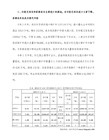
22. Have you seen spy planes, helicopters and space shuttles?
你们见过间谍飞机、直升飞机、航天飞机吗?
23. Did you watch on TV the tragedy of Columbia Space Shuttle of the U.S.?
propel v. 推动
respectively adv. 各自,分别
rifle n. 步枪
strategic adj. 战略的
军事英语翻译:反对恐怖主义
27. Counter-terrorism is a topical subject.
反恐是一个热门话题。
45. Has he been dead or still alive?
他是死是活?
46. No one knows except himself, I'm afraid.
恐怕除了他自己无人知晓。
Words and Expressions单词和短语
terrorist n. 恐怖分子
是纽约9?11攻击事件。
33. Four planes were hijacked by terrorists almost at the same time.
四架飞机几乎同时被恐怖分子劫持。
34. Two of them respectively attacked the towers of the World Trade Center.
分别是子弹、炸弹、炮弹、凝固弹、定时炸弹、手榴弹。
16. What are in the boxes?
这些箱子里是什么?
17. They are explosives and mines.
从作战角度探讨军事英语翻译方法
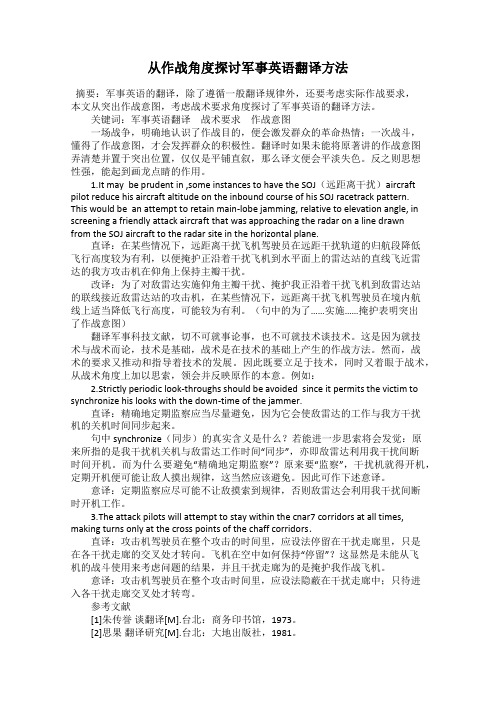
从作战角度探讨军事英语翻译方法摘要:军事英语的翻译,除了遵循一般翻译规律外,还要考虑实际作战要求,本文从突出作战意图,考虑战术要求角度探讨了军事英语的翻译方法。
关键词:军事英语翻译战术要求作战意图一场战争,明确地认识了作战目的,便会激发群众的革命热情;一次战斗,懂得了作战意图,才会发挥群众的积极性。
翻译时如果未能将原著讲的作战意图弄清楚并置于突出位置,仅仅是平铺直叙,那么译文便会平淡失色。
反之则思想性强,能起到画龙点睛的作用。
1.It may be prudent in ,some instances to have the SOJ(远距离干扰)aircraft pilot reduce his aircraft altitude on the inbound course of his SOJ racetrack pattern. This would be an attempt to retain main-lobe jamming, relative to elevation angle, in screening a friendly attack aircraft that was approaching the radar on a line drawnfrom the SOJ aircraft to the radar site in the horizontal plane.直译:在某些情况下,远距离干扰飞机驾驶员在远距干扰轨道的归航段降低飞行高度较为有利,以便掩护正沿着干扰飞机到水平面上的雷达站的直线飞近雷达的我方攻击机在仰角上保持主瓣干扰。
改译:为了对敌雷达实施仰角主瓣干扰、掩护我正沿着干扰飞机到敌雷达站的联线接近敌雷达站的攻击机,在某些情况下,远距离干扰飞机驾驶员在境内航线上适当降低飞行高度,可能较为有利。
(句中的为了……实施……掩护表明突出了作战意图)翻译军事科技文献,切不可就事论事,也不可就技术谈技术。
浅谈军事英语的翻译策略

浅谈军事英语的翻译策略军事用语是指在军事领域中,军人传达军事信息和与军事活动有关的专用语,由于其使用范围是在军队中,涉及大量的军事内容和指示性词汇,军事英语是英语在军事学方面的应用,由于其涉及大量专业性的军事信息,军事英语的翻译有其独特的翻译策略。
本文旨在分析军事词汇的翻译原则及技巧,力求为军事英语翻译提供一些方法供翻译学者们参考,为军队现代化发展培养更多军事翻译人才。
通过科技进步和技术革新,世界各国的军事实力不断提高,军事化进程不断加快。
军事英语的内容涉及的领域不仅包括军事,还包括经济、文化、科技、政治,还有外交等等,因此在翻译军事英语时不仅要掌握广博的知识,更要学会根据实际情况采用正确的翻译策略和技巧。
一、军事英语翻译的必要性军事的直接影响一个国家的发展和国际影响力,军事能力的强大与否牵扯到在国际社会上的话语权。
军事翻译直接服务于国家军队,是国家发展军事软实力的重要途径。
加强军事翻译人才的教育,促进国际军事文化交流,引进先进的军事技术和军事发展理论,对于加强中国军事软实力建设,提高军队外语能力,建设一支现代化的人民军队,提高国家的国际影响力具有深刻影响。
军事英语不同于其他文体的翻译,它有其独特的语言特征。
在语义上,军事英语的具有特义性、单义性和准确性的特点;在使用上,军事英语具有简洁性、统一性和隐义性的特点;在形式上,多使用省略语、复合词和简单口语。
根据军事英语的特点,在翻译策略上我们需要探索出一条适合军事英语的独特翻译道路,为军事英语的发展奠定理论基础,引导译者采取合适有效的翻译方法,力求能够准确、简洁、规范的翻译好军事英语,促进国家军事力量的不断发展。
二、军事用语的翻译策略1.词义准确作为一名合格的军事英语翻译者,首先要具备一定的军事专业知识,在翻译军事用语时,要注意了解军事语言的特定含义,保证每个词汇的词义准确。
在省略词及密语代号的翻译过程中,不能简单考虑常义以偏概全,而应深入了解军事词汇的内涵,做出一份忠实准确的译文。
军事类英语词汇带翻译意思(2)

军事类英语词汇带翻译意思(2)军事类英语词汇:c开头C-130 transport C-130运输机C-17 Globemaster III' C-17环球空中霸王Ⅲ运输机Camp Lejeune 乐洁恩营(美国北卡罗莱纳州)capsicum spray (CS) 辣椒喷剂captive 俘虏captured 被俘虏Cavalry Division 骑兵师Central Command Chief Army General Tommy Franks 中央总部指挥官法兰克斯check-point 检查站Chemical Ali (Ali Hassan al-Majid) 化武亚里(原名阿里马哲特,因协助萨达姆﹒侯赛因统领化学气体武器而得此名)CIA Director George Tenet 中情局局长特立circle 盘旋civilian casualties 平民死伤civvies 穿便服的平民cluster bomb 集束弹coalition commanders 联军指挥官Cobra attack helicopter 眼镜蛇攻击型直升机collateral damage 间接的破坏combatant 参战的人/与战者commander 指挥官commando 突击队comprehensive sanctions 全面制裁comrade 战友contingent 分遣队conventional artillery 常规炮弹conventional War 常规战争convoy 护航队cordon 哨兵线counterattack 反击counterintelligence 反间谍活动counter-terrorism 反恐怖主义活动cruise missile 巡航导弹军事类英语词汇:d开头Daisy Cutter = BLU-82“滚球”炸弹/温压弹(1.5万磅重的大家伙,战争时用于在丛林中开辟直升机着陆场。
CATTI证书-翻译-双语-新闻-战争wars wars wars

乌克兰官员还担心,俄罗斯军方将
采取焦土战术,并在撤军后留下破 坏痕迹。乌克兰总统沃洛德米尔·泽 伦斯基的顾问米哈伊洛·波多利亚克 周四声称,俄罗斯 “希望将赫尔松 变成'死亡之城'”。
The Russian military “mines everything they can: apartments, sewers. Artillery on the left [eastern] bank plans to turn the city into ruins. This is what ‘Russian world’ looks like: came, robbed, celebrated, killed ‘witnesses,’ left ruins and left,” Podolyak tweeted.
时政新闻
NEWS
赫尔松—俄乌战争新焦点
Ukraine’s military said it had retaken swathes of territory in Kherson on Thursday after Moscow ordered a partial withdrawal from the area, though officials in Kyiv warned that retreating Russian soldiers could turn the regional capital into a “city of death” on their way out.
Moscow on Wednesday said its troops would withdraw from the west bank of the Dnipro River, an area that includes Kherson city, in one of the biggest military setbacks for Russia since its invasion began. A spokesman for the Russian Defense Ministry said that effort began the following day.
军事英语词汇大全了解军事领域的专业术语
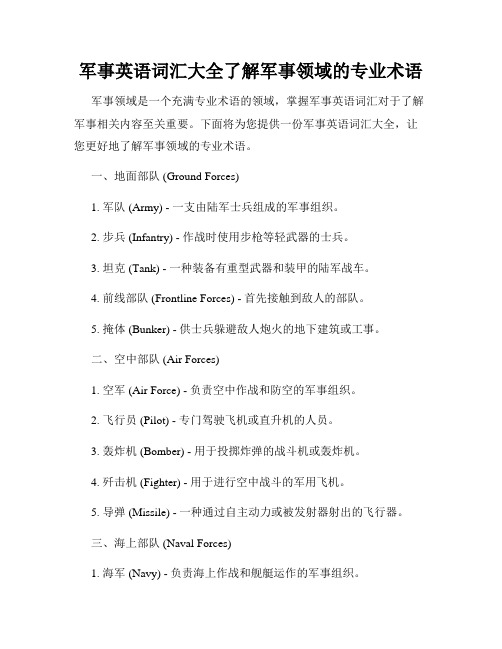
军事英语词汇大全了解军事领域的专业术语军事领域是一个充满专业术语的领域,掌握军事英语词汇对于了解军事相关内容至关重要。
下面将为您提供一份军事英语词汇大全,让您更好地了解军事领域的专业术语。
一、地面部队 (Ground Forces)1. 军队 (Army) - 一支由陆军士兵组成的军事组织。
2. 步兵 (Infantry) - 作战时使用步枪等轻武器的士兵。
3. 坦克 (Tank) - 一种装备有重型武器和装甲的陆军战车。
4. 前线部队 (Frontline Forces) - 首先接触到敌人的部队。
5. 掩体 (Bunker) - 供士兵躲避敌人炮火的地下建筑或工事。
二、空中部队 (Air Forces)1. 空军 (Air Force) - 负责空中作战和防空的军事组织。
2. 飞行员 (Pilot) - 专门驾驶飞机或直升机的人员。
3. 轰炸机 (Bomber) - 用于投掷炸弹的战斗机或轰炸机。
4. 歼击机 (Fighter) - 用于进行空中战斗的军用飞机。
5. 导弹 (Missile) - 一种通过自主动力或被发射器射出的飞行器。
三、海上部队 (Naval Forces)1. 海军 (Navy) - 负责海上作战和舰艇运作的军事组织。
2. 航母 (Aircraft Carrier) - 装备有舰载机的大型舰艇,可用于舰载机起降。
3. 潜艇 (Submarine) - 能在水下航行的战舰。
4. 驱逐舰 (Destroyer) - 一种用于执行护航任务、实施攻击和布雷的军舰。
5. 舰队 (Fleet) - 由多艘军舰组成的编组,用于执行特定任务。
四、战术与策略 (Tactics and Strategy)1. 防御 (Defense) - 针对敌方进攻采取的保卫措施。
2. 进攻 (Offense) - 发起攻击或进攻敌方的行动。
3. 侦察 (Reconnaissance) - 获取情报和敌情,以便做出相应的决策。
军事类英语词汇带翻译意思

军事类英语词汇带翻译意思在英语的学习中,词汇量的积累无疑是很重要的,有关军事类的英语单词你知道多少呢,下面是店铺整理的一些军事类英语词汇,希望对大家有帮助。
军事类英语词汇101st Airborne Division 第一零一空降师173rd Airborne Regiment 第一七三空降团1st Marines Expeditionary Force 海军陆战队第一远征军2nd Brigade of the 3rd Infantry Division 第三步兵师第二装甲旅2nd Brigade 第二旅3rd Infantry Division 第三步兵师50-caliber machine guns .50口径机枪/12.7mm 机枪(自动步枪是automatic rifle或auto rifle。
)50-caliber machine guns 五十口径自动步枪70th Armoned Division 第七十装甲师7th Armoned Brigade, or the Desert Rats 第七装甲旅, 又称沙漠之鼠军事类英语词汇:a开头a revolutionary left 革命派左翼分子a team of deminers 扫雷小组A-10 Thunderbolt planes (Warthog) A-10 "雷霆"对地攻击机(昵称疣猪)Abrams tank M1 "艾布拉姆斯"坦克Abrams tank 艾布兰坦克Abu Ghurayb Palace 阿布古拉卜宫advance 推进aerial bombardment 空袭aerial bombs 航弹/航空炸弹aerial bombs 空投炸弹aid workers 救援人员air assault/attack/barrage/raid/strike 空袭air attack alarm/air-raid siren 空袭警号air base 空军基地air defense system 防空系统Air Force 空军Airborne Brigade 空降旅Airborne Division 空降师Airborne Division’s Aviation Brigade 空降师空中旅air-defense unit 防空部队airfield 军用机场air-to-air missile (AAM) 空空导弹air-to-ground attack 空对地袭击air-to-ground missile (AGM) 空地导弹Al Jazeera Broadcast 半岛电视台 (卡塔尔)Al Kut 库特Al-Azimiyah Palace 阿宰米耶宫Albanian leader Hashim Thaci 阿族领袖特哈契Ali Hassan al-Majid 亚里马基德Al-Jazeera Satellite Channel 卡塔尔半岛电视台卫星频道allegiance 效忠allied troops / Coalition troops/forces 联军al-Qaeda leaders "基地"组织领袖al-Qaeda leaders 亚盖达领袖ambush 埋伏Amman 安曼ammunitions 弹药amphibious assault vehicle 两栖突击车amphibious light tank 两栖作战轻型坦克amphibious. assault vehicle 两栖战车an axis of evil 邪恶轴心anarchy 无政府状态anti-aircraft artillery/ fire 防空高射炮anti-chemical suit 防生化战衣anti-tank missiles 反坦克飞弹anti-U.S. sentiment 反美情绪Apache Attack Helicopter 阿帕奇攻击型直升机Apache Longbow "长弓"阿帕奇直升机Apache Longbow (Advanced Attack Helicopter) 阿帕奇长弓先进攻击型直升机Arab guerilla fighter 阿拉伯游击队员armed blockades 武装封锁线armor 装甲armored column 装甲队伍Armored Division 装甲师armored forces 装甲部队armored Humvee all-terrain vehicles 悍马多用途装甲运输车armored personnel carrier 装甲运兵车armored vehicle 装甲车arms control 武器管制artillery fire 炮火artillery rockets 火箭炮artillery shell 大炮的炮弹artillery 大炮assault rifle 突击步枪attack jet 战斗机authoritarianism and extremism 极权主义和极端主义军事类英语词汇:b开头B-1 bomber B-1轰炸机B-52 bomber B-52轰炸机Ba’ath Party 社会复兴党Baghdad 巴格达ballistic missile 弹道导弹barrack 军营Basra 巴士拉 (伊拉克首都巴格达以南第二大城市) battalion 营beacon 烽火besiege 包围besieged cities 被攻占的城市biochemical suit /biohazard suit 防毒衣biological and chemical weapons 生物武器Black Hawk helicopter 黑鹰直升机Bomb Impact Assessment 轰炸评估bombardment 轰炸Bradley armored vehicle 布雷德利装甲车Bradley Fighting Vehicles = M2“布雷德利”步兵战车Bradley Fighting Vehicles 布雷德利战车。
湖北省翻译大赛决赛名单
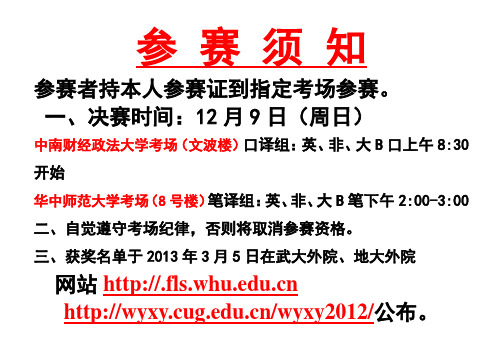
参赛须知参赛者持本人参赛证到指定考场参赛。
一、决赛时间:12月9日(周日)中南财经政法大学考场(文波楼)口译组:英、非、大B口上午8:30开始华中师范大学考场(8号楼)笔译组:英、非、大B笔下午2:00-3:00二、自觉遵守考场纪律,否则将取消参赛资格。
三、获奖名单于2013年3月5日在武大外院、地大外院网站公布。
中南财经政法大学考场(文波楼)上午8:30开赛第一考场:英语专业口译组(语音101室、62人)武芳(武大外院)陈曦(武大外院)邓玉红(武大外院)刘雪霜(武大外院)张露(武大外院)王诗琦(武大外院)王烨(武大外院)朱柴铭(武大外院)赵真真(武大外院)高晓瑞(武大外院)葛琳娜(武大外院)张怡宁(武大外院)胡晓(武大外院)王晴博(武大外院)杨泽亚(武大外院)谢歆(武大外院)龙亦凡(武大外院)许媛媛(武大外院)王颖洁(武大外院)武悠悠(武大外院)徐方园(武大外院)高瑾(武大外院)陈兆荣(武大外院)王希(武大外院)孙晓卉(武大外院)徐梅红(华科外院)尹伊(华科外院)李蕊(华科外院)姜淑雯(华科外院)王龙(华师外院)彭美容(华师外院)胡娅婷(华师外院)罗新(华师外院)刘凡(华师外院)范娜娜(华师外院)葛佳彬(华师外院)孙奕(华师外院)于永强(华师外院)张国奇(华师外院)肖璐凝(华师外院)邵婷婷(华师外院)陈馨(华师外院)陈敏慧(华师外院)田宵(华师外院)申曙曙(华师外院)王丹婷(华师外院)付展雄(华师外院)罗开眉(华师外院)甘荣荣(华师外院)程昕(华师外院)胡晓勖(华师外院)吴非(华师外院)许洲(华师外院)张悦(华师外院)刘海嘉(华师外院)熊成思(华师外院)张晓莉(华师外院)周雅琴(华师外院)黄雪琪(华师外院)张小冬(华师外院)庄维(华师外院)蔡贝贝(华师外院)第二考场:英语专业口译组(语音102室、63人)李健敏(华师外院)涂颖(华师外院)邓颖(华师外院)王亚男(华师外院)黄娇娇(华师外院)梁考静(华师外院)何荷(华师外院)俞凡(华师外院)刘菁(华师外院)王冬梅(华师外院)肖梦林(华师外院)姚灵翌(华师外院)徐珉君(华师外院)张雨(华师外院)魏琛(华师外院)孙源远(华师外院)吴宏辉(华师外院)罗园(华师外院)戴雨秀(华师外院)耿黎(地大外院)余欣(地大外院)李丹丹(地大外院)王菊芳(地大外院)程小婉(地大外院)刘姿驿(地大外院)李纪超(地大外院)付莉(地大外院)马玉超(地大外院)徐昱涛(地大外院)吴慧珠(地大外院)张珊珊(地大外院)冯小倩(地大外院)况霍凌霄(地大外院)何睿(地大外院)王静(财大外院)谢晨霞(财大外院)徐蔚(财大外院)赵文佳(财大外院)刘倩倩(财大外院)徐梦婷(财大外院)林宽(财大外院)蔡四林(财大外院)何彬(财大外院)么文浩(财大外院)潘佳燕(财大外院)牟腾(财大外院)赖淑琦(财大外院)李呢喃(华农外院)郑娇(华农外院)郭思源(华农外院)王毅(华农外院)唐文君(华农外院)袁亚灵(华农外院)王怡安(华农外院)张雅飘(华农外院)宁静(华农外院)王丹妮(华农外院)陈曦(华农外院)孙颖(华农外院)孟令见(华农外院)耿丹阳(华农外院)张贝贝(民大外院)霍梓媚(民大外院)陈愿(理工外院)林红霞(理工外院)鲁博泽(理工外院)程思琪(理工外院)白婧(理工外院)郭烨(理工外院)孙诗达(理工外院)李诗怡(理工外院)杨丹(理工外院)王颖(理工外院)矢可姝(理工外院)代亦娇(工大外院)王文逸(工大外院)邱慧心(工大外院)李小凤(工大外院)段敏(工大外院)童方碟(工大外院)王诗雅(工大外院)孙瑞(工大外院)初延明(工大外院)王清(工大外院)汪希娟(工大外院)刘家琛(工大外院)万玉真(工大外院)陈雯(工大外院)陆滨(湖大外院)叶谦(湖大外院)朱江山(湖大外院)朱倩(湖大外院)方茜(湖大外院)裴利娟(湖大外院)余悟(湖大外院)夏楚婕(湖大外院)宋一平(二师外院)王亚玲(二师外院)田洁(二师外院)汪宇珂(二师外院)陈珂(二师外院)任冲(二师外院)李沁雪(二师外院)朱丽英(二师外院)李显格(二师外院)崔兴博(二师外院)高显鑫(二师外院)金蕾(二师外院)李娜(二师外院)樊迪(二师外院)邱焱晗(二师外院)李小莹(湖工外院)邹瑶(湖工外院)戴吉妮(湖工外院)游娅玲(湖工外院)方惠娟(湖工外院)彭博文(湖工外院)陈颖(湖工外院)陈鹏(湖工外院)彭辉(湖工外院)张婧(湖工外院)高莹(湖工外院)王卫莲(湖工外院)冷霜(湖工外院)柯志海(湖工外院)陈漫(湖工外院)王星(湖工外院)喻琴(湖工外院)丁文耀(湖工外院)张峰(湖工外院)陈真(湖工外院)吴梦洁(湖工外院)王珂(湖工外院)廖丁(武工外院)刘梦龄(武工外院)吴格格(武工外院)皮乐(武工外院)罗辛(纺大外院)李勉(纺大外院)邵斯嘉(纺大外院)王雪颖(纺大外院)胡敏(纺大外院)温晴(纺大外院)龙宇双(纺大外院)王鹏远(纺大外院)任红江(纺大外院)阮慧(纺大外院)徐欢(纺大外院)李春风(湖中医大)方胡钢(湖中医大)黄天晓(湖中医大)张晓玲(湖中医大)唐举(湖中医大)石彩燕(湖中医大)李婷(湖中医大)刘芳(湖中医大)樊帆(湖中医大)孙小丽(湖中医大)黄灵子(湖中医大)潘巧玲(武汉体院)李青岑(武汉体院)汪济杰(武汉体院)徐俊轩(武汉体院)江沙(武汉体院)樊成(武汉体院)朱思奇(江大外院)陈柳(江大外院)杜薇(江大外院)李桐(江大外院)黄倩(江大外院)张媛媛(江大外院)石佩(江大外院)杨青(江大外院)朱焜(江大外院)董惠敏(湖北经院)石菲(湖北经院)樊娜(湖北经院)胡琛(湖北经院)童昆琳(湖北经院)张萌(湖北经院)林青春(湖北经院)杨灿(湖北经院)杨艳华(湖北经院)晏春枝(文华学院)何亚(汉口学院)康鑫(汉口学院)余晓云(汉口学院)秦琳(汉口学院)第五考场:英语专业口译组(语音105室、62人)孟思(汉口学院)魏欣怡(汉口学院)蔡洋洋(汉口学院)向东云(汉口学院)黄宏宇(汉口学院)周纾(东湖学院)肖莹(东湖学院)孙甜荔(东湖学院)赵叶丽(东湖学院)徐庆凤(东湖学院)庹海伦(东湖学院)郑安妮(华师传媒)胡诗琦(华师传媒)李尚青(华师传媒)白钐(华师传媒)杨娇(华师传媒)张子晔(华师传媒)胡婷(华师传媒)王军霞(华师传媒)张颖(华师传媒)黄黎璐(武昌分校)黄思嘉(武昌分校)杜琛(武昌分校)田甜(武昌分校)王小飞(地大江城)武建(地大江城)张艳(地大江城)李林蔚(地大江城)李健(地大江城)王芬奇(地大江城)章寒(地大江城)龙雨(理工华夏)姜胜利(理工华夏)周杰(长江工商)陈颖清(长江工商)杨雪(长江工商)吴曼(长江工商)方垚(长江工商)孟璐(长江工商)朱星星(长江工商)韩莹(长江工商)郭雅兰(长江工商)董正菊(长江工商)黄秀娟(湖大知行)韩冰权(湖大知行)盛文琪(湖大知行)罗承芳(湖大知行)杨阳(湖大知行)陈琦(湖大知行)卢莹(湖大知行)张婷婷(湖大知行)王亚琪(湖大知行)梅杰(湖大知行)王齐(湖大知行)陈果(湖大知行)徐聪(湖大知行)刘伊琳(湖大知行)刘昭廷(湖大知行)祝宜芳(武科城院)卢怡(武科城院)汪巧红(武科城院)康佳(武科城院)第六考场:英语非专业口译组(语音106室、54人)彭雅蕊(武大经管)傅宇韬(武大资环)刘抒曼(武大社会)熊维瑛(武大新闻)孙培峰(武大资环)谢金哲(武大土建)唐裕文(武大经管)罗颖婕(武大经管)张晓玥(武大经管)田宏邈(武大经管)谢津晶(武大数院)刘词(武大经管)陈懿林(武大医学)王天奇(武大计算)李冠铭(武大水利)罗青天(武大经济)杨睿(武大经管)周小力(武大经管)陈颖楠(武大水利)孙嘉(武大测绘)胡诗怡(武大水电)谭雅伦(武大药院)刘畅(武大金融)蒋金麟(武大土建)柏雪(武大印刷)曹艺凡(武大统计)董衍韬(武大统计)张静怡(武大信息)彭志凌(武大信息)黄诗禹(武大计算)李笛(武大政管)郭沐青(武大哲院)李慧(武大经管)祝漩(武大物理)廖冰清(武大经管)王心宇(武大经管)徐旻(武大土建)曹怡然(武大经管)王书颖(武大经管)杨天娇(武大数学)杨彦卿(武大外院)熊丹枫(武大外院)吴爽(武大外院)杜喻涵(武大经管)梅婷(武大经管)杨承铸(武大信息)周韦(武大药院)叶勇灵(武大医院)孙璐(武大城规)朱睿希(武大测绘)滕越(武大经管)吴建每(武大政治)袁定一(武大经管)曹锐(武大护理)张珂(武大政管)季婧(武大国软)李美丽(武大信息)陈雯(武大经管)刘星(武大医学)张星辰(武大经管)苗晓晓(武大信息)胡修凡(武大遥感)李秋怡(武大经管)刘耀丹(武大医学)杨希(武大信息)张佳音(武大口腔)闫玺(武大数学)刘盈杏(武大经管)郭莹菁(武大经管)谢沁园(武大国贸)曹雪(武大电子)周骋楠(武大经管)李昱(武大水利)纪执瑞(武大新闻)李智慧(武大经管)赵亚茹(武大水利)杨艺芳(武大经管)胡韦名(武大遥感)何婷(武大基医)岳嘉曦(武大口腔)卜文博(武大软件)谢宇星(武大软件)黄妍琰(华中师大)朱颖(华中师大)国怡文(华中师大)许小可(华中师大)周文棋(华中师大)王希贤(华中师大)黄梦杰(华中师大)王晓娟(中国地大)任盼(中国地大)龙昭月(中国地大)张太乐(中国地大)仇铭(中国地大)崔维伊(中南财大)李慧珍(中南财大)李知常(中南财大)白怡文(中南财大)郭艳婷(中南财大)王竹勋(中南财大)陈文琳(中南财大)杨霈(中南财大)魏峥(中南财大)潘绀(中南财大)钱路韵(中南财大)许晟(中南财大)曹政(中南财大)王丹红(中南财大)阴梦雪(中南财大)杨璇(中南财大)王甜甜(中南财大)韩申(中南财大)文安(中南财大)杨冰清(中南财大)戴静莹(中南财大)董浩亮(中南财大)黄韬(中南财大)徐榕(中南财大)刘洁(中南财大)盛思雨(中南财大)王安琪(中南财大)陈曦(中南财大)许悦(中南财大)吴婧瑜(中南财大)张芊芊(中南财大)魏丽玮(中南财大)吴迪(中南财大)许博涵(中南财大)邹正昌(中南民大)郑云鹤(理工大学)铉羽(理工大学)周弘晔(理工大学)翟辰懿(理工大学)肖容(理工大学)何梦颖(理工大学)金玉佩(理工大学)张晓兰(理工大学)张志(理工大学)欧慧琳(武汉工大)陆建超(武汉工大)李琰(武汉工大)程忞慧子(武汉工大)娄文娟(武汉工大)曾梅君(武汉工大)卢雨晴(武汉工大)谢晓晨(武汉工大)侯俊烨(武汉工大)张雄杰(武汉工大)余英杰(武汉工大)瞿昊(武汉工大)杨纯(武汉工大)王思淇(武汉工大)魏雪淇(武汉工大)姜筱颖(武汉工大)危欢虹(武汉工大)舒文雯(武汉工大)毛文萍(武汉工大)周文卿(武汉工大)朱蒙(武汉工大)余晓笛(武汉工大)郭卉(武汉工大)张钰彬(武汉工大)李兴(武汉工大)杨玲(武汉工大)杜文琦(武汉工大)杨莉婕(武汉工大)徐尧(武汉工大)杨红(武汉工大)李晗(武汉工大)黎素红(武汉工大)赵婷婷(武汉工大)蔡斌(武汉工大)石梦琳(武汉工大)金慧(武汉工大)朱瑛(武汉工大)胡凌子(武汉工大)高海军(武汉工大)赵颖歆(武汉工大)杨雪婧(武汉工大)谢迪(湖北大学)陈佳璐(湖北大学)姚凯彬(湖北大学)肖琼(湖北大学)张玲琳(湖北大学)程绍阳(湖北二师)胡晓晨(湖北二师)董润雄(湖北二师)唐秋莹(湖北二师)江唯(湖北二师)郑彬(湖北二师)魏茹月(湖北二师)应当(华中农大)许方依(湖北工大)陈鹏飞(武汉工院)毛天宇(武汉工院)吴雪君(武汉工院)费腾(武汉工院)李志鹏(武汉工院)黄灿(武汉工院)陈明慧(武汉工院)张瑛(武汉工院)何乐(武汉工院)艾隽如(武汉工院)曾琪(武汉工院)蒋旗旋(武汉工院)王录卫(武汉工院)晋思嫄(武汉工院)龙飘(武汉工院)肖鹏(武汉工院)陈泠霏(武汉工院)肖睿麒(武汉工院)王曦(武汉工院)余筱倩(武汉工院)刘梦雪(武汉工院)杨雄(武汉纺大)第十考场:英语非专业口译组(语音203室、53人)孙雨婷(武汉纺大)李光正(武汉纺大)刘梦婷(武汉纺大)许佳琦(武汉纺大)姚莹(武汉纺大)高袁思思(武汉纺大)危惠明(武汉纺大)罗振华(武汉纺大)李放(武汉纺大)王廉铭(武汉纺大)沈周涵(军事经院)王睿哲(军事经院)张鹏程(军事经院)陈泽华(军事经院)黄娅婕(军事经院)胡博(军事经院)毛嘉宁(军事经院)唐旭南(军事经院)付森(军事经院)代威(军事经院)陈宇凯(军事经院)李政(武汉体院)曾伊蕾(江汉大学)喻鸣(江汉大学)肖莎莎(江汉大学)卢锐(江汉大学)刘韵璐(江汉大学)黄海(江汉大学)安碧云(江汉大学)刘尊龙(江汉大学)陈玫妍(江汉大学)程智(江汉大学)黄奕鸣(江汉大学)郑嘉懿(江汉大学)叶玲(江汉大学)吴维之(湖北经院)罗梓文(湖北经院)王欣轶(湖北经院)王超(华科文华)应晨雨(华科文华)际雅琪(地大江城)彭慧张(地大江城)周文曾(地大江城)张怡(地大江城)孙晓彤(地大江城)王文清(地大江城)陈一(武昌分校)邓晨(武昌分校)谢耀晖(武昌分校)印家瑞(武昌分校)程凡(武昌分校)张纯(武昌理工)汪刘莹(武科城院)第十一考场:英语大学B口译组(语音204室、59人)王加昌(华科文华)黄慧鹂(华科文华)董静祎(华科文华)赵欣(华科文华)杨莹莹(华科文华)彭康蕾(华科文华)关巧(华科文华)孙娱(华科文华)关胜男(华科文华)唐金桃(华科文华)陈琳(华科文华)薛丹(华科文华)李正翔(华科文华)郝晴瑶(华科文华)尹晨希(华科文华)李雅伦(华科文华)王佳其(华科文华)林莉(华科文华)卢超(华科文华)许家卉(华科文华)吴燕玲(华科文华)秦怡洁(华科文华)陈伯蓉(华科文华)严曼珂(华科文华)黄端玉(华科文华)梁仕浩(华科文华)胡天碧(华科文华)吕四文(华科文华)刘晶(华科文华)刘俊(华科文华)王孔霞(华科文华)林朦(华科文华)苏玉立(华科文华)胡欣(华科文华)刘卿鑫(华科文华)梁弦健(华科文华)肖青(华科文华)周繁(华科文华)文淇(华科文华)张迪(华科文华)吴哲锋(华科文华)廖春阳(华科文华)崔瑞琴(华科文华)余芬(华科文华)肖路瑶(华科文华)余晓凡(华科文华)卢琨(华科文华)吕昭昭(华科文华)鲁西子(华科文华)刘彩彩(华科文华)徐佩(华科文华)李欣然(华科文华)余杨(华科文华)冯玉兰(华科文华)宋佳暖(华科文华)张玉玲(华科文华)王玥(华科文华)甘路(华科文华)张穗(华科文华)徐海桥(华科文华)庞玲玲(华科文华)马姗姗(华科文华)许欢(华科文华)陈玲(华科文华)黄宇琳(华科文华)朱灵卉(华科文华)石长军(华科文华)刘爽(华科文华)洪依民(华科文华)王柏林(华科文华)徐钰(华科文华)熊博施(华科文华)王晓越(华科文华)白珊(华科文华)石云(华科文华)谢领江(华科文华)罗文静(华科文华)鲁静雅(华科文华)但奎(华科文华)胡轶(东湖学院)李天瑶(东湖学院)高浩(东湖学院)谭霜阳(东湖学院)钱丽(珞珈学院)刘星源(珞珈学院)王菁(珞珈学院)黄玉婷(珞珈学院)朱宜梅(珞珈学院)费魅思(珞珈学院)马静婕(珞珈学院)熊妙(珞珈学院)胡容(珞珈学院)李倩云(珞珈学院)陈毅(珞珈学院)朱虹(珞珈学院)王振东(珞珈学院)林卓天(珞珈学院)刘佩(珞珈学院)任华(珞珈学院)肖萧(汉口学院)王雅哲(汉口学院)王韦(汉口学院)戴俊雄(汉口学院)张心怡(华师传媒)颜祖豪(华师传媒)李罡(华师传媒)涂哲凡(华师传媒)赵明(华师传媒)席霁(华师传媒)刘雅欣(华师传媒)郭媚(华农楚天)毛敏(华农楚天)张齐林(华农楚天)赵盼盼(华农楚天)陈莉莉(华农楚天)廖蕾(纺大外经)彭昆(军事经院)顾晓雪(军事经院)解晓蓓(军事经院)朱明(军事经院)叶康(军事经院)童晓阳(军事经院)朱佳浩(军事经院)韩丹(军事经院)牟铜(军事经院)于广林(军事经院)代敏(湖北经院)马尹珍(湖工商贸)严沁(湖工商贸)王娇(湖工商贸)江剑书(湖工商贸)吴淑娟(湖工商贸)谢建雄(湖工商贸)张崇语(湖工商贸)方漫(湖工商贸)潘玲(湖工商贸)陈蝶(湖工商贸)李文超(湖工商贸)燕妮(湖工商贸)王睿照(湖工商贸)彭凡(湖工商贸)熊妍(湖工商贸)邹程(湖工商贸)万美玲(湖工商贸)吴潇潇(湖工商贸)秦雨辰(湖工商贸)张雪(湖工商贸)余昔东(湖工商贸)王静(湖工商贸)李显韫(工大信邮)徐妍琪(工大信邮)黄贝(工大信邮)杨正(工大信邮)余思思(理工华夏)代雯婷(理工华夏)张卫萍(理工华夏)夏澍雨(湖大知行)刘燕(湖大知行)叶晨露(武昌理工学院)高燕(武昌理工学院)张晓欣(武昌理工学院)马可(武昌理工学院)许玲娜(武昌理工学院)崔梦艺(武汉商院)阮姿兰(武汉商院)狄思思(武汉商院)陈燕(武汉商院)汪蕾(武汉商院)李铁城(武昌工院)朱怡林(江大文理)程慧娟(江大文理)蔡俊(江大文理)华文秋(江大文理)黄璇(江大文理)程振武(工程职院)陶建(工程职院)梁璐琪(江大卫院)华中师范大学考场(8号楼)下午2:00-3:00第一考场:英语专业笔译组(8101教室、95人)王冬娥(武大外院)李娅(武大外院)翟瑜佳(武大外院)高瑾(武大外院)武芳(武大外院)王源(武大外院)郑茜(武大外院)蒋辛瑞(武大外院)谢婷婷(武大外院)邓谦(武大外院)王添翼(武大外院)叶星星(武大外院)毛慧芳(武大外院)王烨(武大外院)张天娇(武大外院)邓玉红(武大外院)宛方(武大外院)贺敬芝(武大外院)张怡宁(武大外院)魏玉文(武大外院)龙亦凡(武大外院)曹菁(武大外院)刘星滟(武大外院)彭迎(武大外院)卜亚丹(武大外院)葛琳娜(武大外院)陈曦(武大外院)王永选(武大外院)胡晓(武大外院)李辛凡(武大外院)王海云(武大外院)王晓燕(武大外院)徐圣华(武大外院)聂馨梅(武大外院)付端攻(武大外院)陈艳秋(武大外院)罗彩甜(武大外院)王安琪(武大外院)孔银银(武大外院)丁方达(武大外院)曹雯婕(武大外院)李旸(武大外院)王明玲(武大外院)嵇阳(武大外院)吴康利(武大外院)曾文婧(武大外院)罗丽(武大外院)黄晶宇(武大外院)芮心玥(武大外院)张晗(武大外院)李童悦子(武大外院)许媛媛(武大外院)王心敏(武大外院)邹文雪(武大外院)刘雪萌(武大外院)陈曦(武大外院)吕凤超(武大外院)郝巧亚(武大外院)王慧敏(武大外院)李沨湄(武大外院)王俣(武大外院)王倩(武大外院)沈晓婷(武大外院)刘雪霜(武大外院)陈佳璐(武大外院)陈姣利(武大外院)张文(武大外院)黄心怡(武大外院)王淑玲(武大外院)夏天(武大外院)姜淑雯(华科外院)于昔(华科外院)何蕾(华科外院)曹轶夫(华科外院)范娜娜(华科外院)陈思嘉(华师外院)叶云云(华师外院)刘文(华师外院)熊俊(华师外院)郑穹(华师外院)付其鹏(华师外院)徐艳(华师外院)乔敏(华师外院)罗新(华师外院)覃姝(华师外院)阎聆萱(华师外院)申曙曙(华师外院)陶晓亮(华师外院)蔡静静(华师外院)常红婧(华师外院)王娜(华师外院)刘美玲(华师外院)张燕(华师外院)胡娅婷(华师外院)侯静雯(华师外院)第二考场:英语专业笔译组(8102教室、75人)杨颖君(华师外院)蔡贝贝(华师外院)葛佳彬(华师外院)张玉培(华师外院)黄欣怡(华师外院)黄惠芳(华师外院)柯贤涛(华师外院)李艳娜(华师外院)康梦妮(华师外院)陈思(华师外院)何丹丹(华师外院)朱昊坦(华师外院)何思洁(华师外院)吴于勤(华师外院)黎莎(华师外院)乔一鸣(华师外院)张郑平(华师外院)庄维(华师外院)孟晋(华师外院)俞凤(华师外院)肖璐颖(华师外院)储云云(华师外院)夏婷婷(华师外院)高园园(华师外院)陈慧(华师外院)孙华(华师外院)汤婷(华师外院)刘郁(华师外院)马文(华师外院)吕婕(华师外院)程梦瑶(华师外院)万杰(华师外院)谢俊源(华师外院)肖梦林(华师外院)王龙(华师外院)李卉(华师外院)孟丽芳(华师外院)黄慧(华师外院)王爱红(华师外院)罗园(华师外院)吴云(华师外院)史昌华(华师外院)余琛(华师外院)甘士艳(华师外院)江霞(华师外院)黄梦霜(华师外院)吴英(华师外院)唐婕(华师外院)柳昱(华师外院)宋越(华师外院)余玉梅(华师外院)马秋萍(华师外院)樊卫青(华师外院)陈馨(华师外院)张婷(华师外院)邓颖(华师外院)阳芬(华师外院)程园芳(华师外院)李冀尧(华师外院)周文博(华师外院)熊仕薇(华师外院)孙奕(华师外院)杨芳(华师外院)叶水美(华师外院)汪欣欣(华师外院)张楠(华师外院)程昕(华师外院)张苗苗(华师外院)汤萍(华师外院)黄瑞(华师外院)刘娜(华师外院)杜洁(华师外院)王正(华师外院)吴宏辉(华师外院)沈烨(华师外院)第三考场:英语专业笔译组(8103教室、75人)吴靓君(华师外院)杨焱(华师外院)燕波(华师外院)卫立平(华师外院)崔思昊(华师外院)田琳(华师外院)舒艾(华师外院)雷文(华师外院)张晨(华师外院)何荷(华师外院)田苗(华师外院)李伊莎(华师外院)张嫱(华师外院)张莹莹(华师外院)邹天雨(华师外院)杜娟(华师外院)万璐(华师外院)廖莎(华师外院)刘奇芬(华师外院)徐珉君(华师外院)吕乐(华师外院)唐霄(华师外院)陈敏慧(华师外院)陈欣然(华师外院)郭纹延(华师外院)方小舟(华师外院)张琴(华师外院)朱巧云(华师外院)陈琦(华师外院)王欣(华师外院)朱庆卉(华师外院)姚娅(华师外院)龚贻娇(华师外院)刘雅婷(华师外院)吴绍文(地大外院)陈静(地大外院)张海英(地大外院)李辉(地大外院)施孟博(地大外院)徐盈(地大外院)田翠萍(地大外院)李智(地大外院)张福亮(地大外院)马明良(地大外院)刘红(地大外院)王随华(地大外院)王昱(地大外院)李艳(地大外院)王凤(地大外院)熊羽洁(地大外院)郑馨楠(地大外院)李梦玲(地大外院)熊静怡(地大外院)何彩云(地大外院)王梦希(地大外院)王菊芳(地大外院)冉垣(地大外院)胡东雪(地大外院)邓小丽(地大外院)王莉莎(地大外院)刘方(地大外院)范瑞(地大外院)马莹(地大外院)朱炼(地大外院)李绍贵(地大外院)刘维佳(地大外院)郄思寒(地大外院)陈娜(地大外院)越佳佳(地大外院)杨纤俐子(地大外院)凌志颖(地大外院)刘明(地大外院)李纪超(地大外院)何睿(地大外院)张珊珊(地大外院)第四考场:英语专业笔译组(8104教室、75人)王培(地大外院)王瑞辑(地大外院)李晓琪(地大外院)许伟萍(地大外院)李小玲(地大外院)朱少杰(地大外院)王璐(地大外院)徐美琳(地大外院)窦海霞(地大外院)耿黎(地大外院)蔡四林(财大外院)张紫云(财大外院)冯芝燕(财大外院)许慕叮(财大外院)杨惠茹(财大外院)赵文佳(财大外院)唐红(财大外院)赵伟(财大外院)王琪琪(财大外院)徐梦婷(财大外院)王静(财大外院)刘慧阳(财大外院)马丹(财大外院)朱琳(财大外院)何彬(财大外院)杨珍珍(财大外院)宋捷(财大外院)付诗惟(财大外院)李欣怡(财大外院)郝娟娟(财大外院)李娜(财大外院)方秋燕(财大外院)张笑迷(财大外院)楼静(财大外院)方柯(财大外院)谢晨霞(财大外院)徐小航(华农外院)王秋芷(华农外院)王丹妮(华农外院)施雯(华农外院)柯贝(华农外院)唐文君(华农外院)黄天枝(华农外院)陶月红(华农外院)谢娅(华农外院)薛军锋(华农外院)孙颖(华农外院)李呢喃(华农外院)陈瑶(华农外院)李经纬(华农外院)张小萍(华农外院)李琦(华农外院)张贝思(华农外院)曾杨梅(华农外院)耿丹阳(华农外院)黄腾幸子(华农外院)雷丹(华农外院)谢湄(华农外院)郭思源(华农外院)孙亚蒙(华农外院)张翌博(华农外院)高虹(华农外院)罗程(华农外院)李元元(华农外院)汪萍丽(华农外院)。
defend派生词
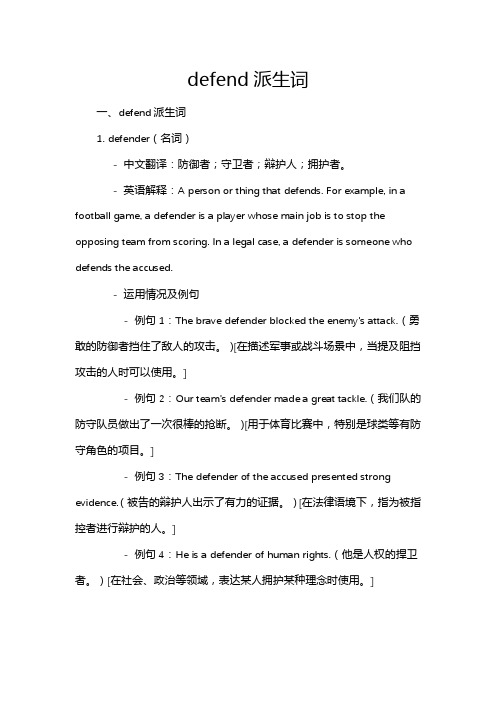
defend派生词一、defend派生词1. defender(名词)- 中文翻译:防御者;守卫者;辩护人;拥护者。
- 英语解释:A person or thing that defends. For example, in a football game, a defender is a player whose main job is to stop the opposing team from scoring. In a legal case, a defender is someone who defends the accused.- 运用情况及例句- 例句1:The brave defender blocked the enemy's attack.(勇敢的防御者挡住了敌人的攻击。
)[在描述军事或战斗场景中,当提及阻挡攻击的人时可以使用。
]- 例句2:Our team's defender made a great tackle.(我们队的防守队员做出了一次很棒的抢断。
)[用于体育比赛中,特别是球类等有防守角色的项目。
]- 例句3:The defender of the accused presented strong evidence.(被告的辩护人出示了有力的证据。
)[在法律语境下,指为被指控者进行辩护的人。
]- 例句4:He is a defender of human rights.(他是人权的捍卫者。
)[在社会、政治等领域,表达某人拥护某种理念时使用。
]- 例句5:The city's defenders fought bravely against the invaders.(城市的守卫者勇敢地对抗侵略者。
)[描述城市保卫战等军事相关的情景。
]- 例句6:The defender of traditional values opposed the new policy.(传统价值观的拥护者反对这项新政策。
中国军事词汇英汉翻译对照
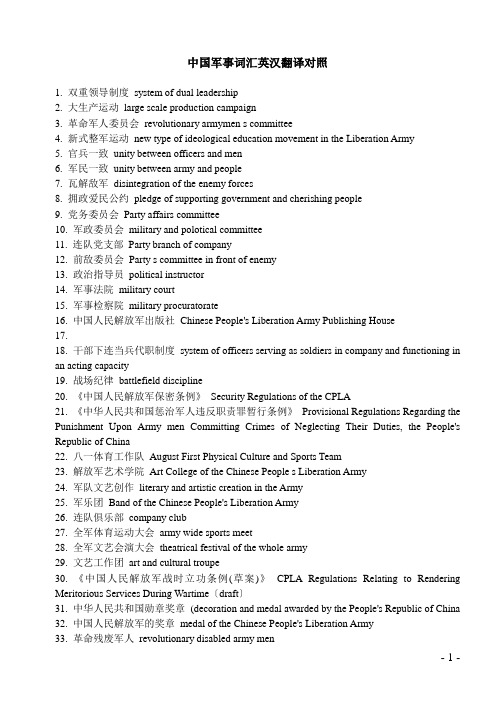
中国军事词汇英汉翻译对照1. 双重领导制度system of dual leadership2. 大生产运动large scale production campaign3. 革命军人委员会revolutionary armymen s committee4. 新式整军运动new type of ideological education movement in the Liberation Army5. 官兵一致unity between officers and men6. 军民一致unity between army and people7. 瓦解敌军disintegration of the enemy forces8. 拥政爱民公约pledge of supporting government and cherishing people9. 党务委员会Party affairs committee10. 军政委员会military and polotical committee11. 连队党支部Party branch of company12. 前敌委员会Party s committee in front of enemy13. 政治指导员political instructor14. 军事法院military court15. 军事检察院military procuratorate16. 中国人民解放军出版社Chinese People's Liberation Army Publishing House17.18. 干部下连当兵代职制度system of officers serving as soldiers in company and functioning in an acting capacity19. 战场纪律battlefield discipline20. 《中国人民解放军保密条例》Security Regulations of the CPLA21. 《中华人民共和国惩治军人违反职责罪暂行条例》Provisional Regulations Regarding the Punishment Upon Army men Committing Crimes of Neglecting Their Duties, the People's Republic of China22. 八一体育工作队August First Physical Culture and Sports Team23. 解放军艺术学院Art College of the Chinese People s Liberation Army24. 军队文艺创作literary and artistic creation in the Army25. 军乐团Band of the Chinese People's Liberation Army26. 连队俱乐部company club27. 全军体育运动大会army wide sports meet28. 全军文艺会演大会theatrical festival of the whole army29. 文艺工作团art and cultural troupe30. 《中国人民解放军战时立功条例(草案)》CPLA Regulations Relating to Rendering Meritorious Services During Wartime〔draft〕31. 中华人民共和国勋章奖章(decoration and medal awarded by the People's Republic of China32. 中国人民解放军的奖章medal of the Chinese People's Liberation Army33. 革命残废军人revolutionary disabled army men34. 革命残废军人学校schools of revolutionary disabled army men35. 革命烈士revolutionary martyrs36. 革命烈士陵园cemetery of revolutionary martyrs37. 战场宣传鼓动conducting propaganda and agitation in battlefield38. 飞夺泸定桥二十二勇士22 Warriors Who Dashed Through the Luding Bridge39. 十七勇士Seventeen Warriors40. 八女投江Eight Heroines who Drowned Themselves in a River41. 狼牙山五壮士Langya Shan Five Heroic Men42. 刘老庄连Liulaozhuang Company43. 群众工作模范团Model Regiment in Doing Mass Work44. 大练岛连Dalian Island Company45. 钢铁营Steel Battalion46. 济南第一团First Regiment in Liberating Jinan47. 临汾旅Linfen Brigade48. 洛阳营Luoyang Battalion49. 塔山英雄团Tashan Heroic Regiment50. 爱国爱岛天涯哨兵Sentries in the Remotest Corner of the Earth Who Love Their Country and Island51. 洞头先锋女子民兵连Vanguard Militiawoman Company of Dongtou52. 法卡山英雄营Faka Shan Heroic Battalion53. 海上先锋艇Vanguard Sea Vessel54. 航空兵英雄中队Heroic Aviation Squadron55. 红旗民兵团Red Flag Militia Regiment56. 红旗民兵营Red Flag Militia Battalion57. 红色前哨连Red Outpost Company58. 护林灭火英雄班Heroic Squad in Protecting Forests and Putting out Extensive Fire59. 坚守英雄连Heroic Company in Holding Fast to Its Position60. 进藏英雄先遣连〔Heroic Advance Company in Marching into Xizang(Tibet61. 抗洪救灾爱民模范营Model Battalion in Fighting Flood and Providing Disaster Relief62. 南京路上好八连Good Eighth Company on Nanjing Road63. 劈山开路先锋连Vanguard Company Cutting Its Way through the Mountains64. 唐山抗震救灾模范连Model Company in Earthquake Relief Work in Tangshan65. 硬骨头六连Hard boned Sixth Company66. 丈量世界屋脊的英雄测绘大队Heroic Mapping Unit Which Surveyed the Roof of the World67. 支前模范连Model Company in Supporting the Front68. 支前模范民兵连Model Militia Company in Supporting the Front。
英语四级翻译模拟试题成吉思汗讲解及翻译
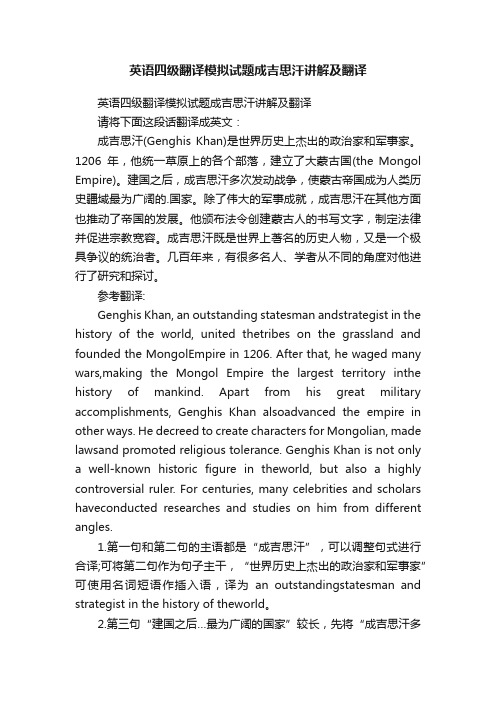
英语四级翻译模拟试题成吉思汗讲解及翻译英语四级翻译模拟试题成吉思汗讲解及翻译请将下面这段话翻译成英文:成吉思汗(Genghis Khan)是世界历史上杰出的政治家和军事家。
1206年,他统一草原上的各个部落,建立了大蒙古国(the Mongol Empire)。
建国之后,成吉思汗多次发动战争,使蒙古帝国成为人类历史疆域最为广阔的.国家。
除了伟大的军事成就,成吉思汗在其他方面也推动了帝国的发展。
他颁布法令创建蒙古人的书写文字,制定法律并促进宗教宽容。
成吉思汗既是世界上著名的历史人物,又是一个极具争议的统治者。
几百年来,有很多名人、学者从不同的角度对他进行了研究和探讨。
参考翻译:Genghis Khan, an outstanding statesman andstrategist in the history of the world, united thetribes on the grassland and founded the MongolEmpire in 1206. After that, he waged many wars,making the Mongol Empire the largest territory inthe history of mankind. Apart from his great military accomplishments, Genghis Khan alsoadvanced the empire in other ways. He decreed to create characters for Mongolian, made lawsand promoted religious tolerance. Genghis Khan is not only a well-known historic figure in theworld, but also a highly controversial ruler. For centuries, many celebrities and scholars haveconducted researches and studies on him from different angles.1.第一句和第二句的主语都是“成吉思汗”,可以调整句式进行合译;可将第二句作为句子主干,“世界历史上杰出的政治家和军事家”可使用名词短语作插入语,译为an outstandingstatesman and strategist in the history of theworld。
军事英语翻译中的词义引申--以翻译《工兵旅在作战行动中的持续保障》为例
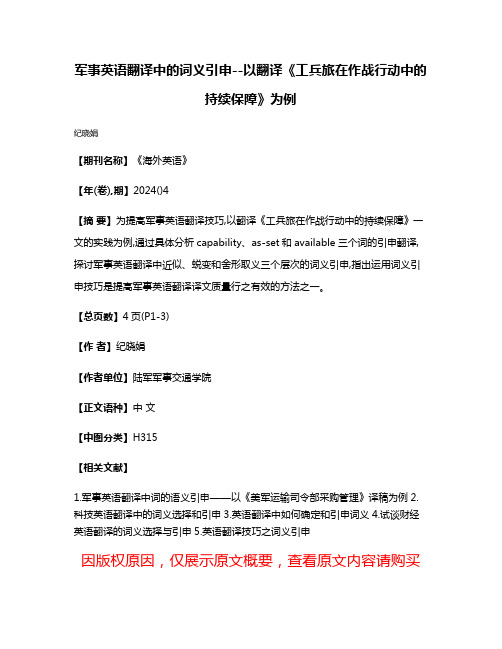
军事英语翻译中的词义引申--以翻译《工兵旅在作战行动中的
持续保障》为例
纪晓娟
【期刊名称】《海外英语》
【年(卷),期】2024()4
【摘要】为提高军事英语翻译技巧,以翻译《工兵旅在作战行动中的持续保障》一文的实践为例,通过具体分析capability、as-set和available三个词的引申翻译,探讨军事英语翻译中近似、蜕变和舍形取义三个层次的词义引申,指出运用词义引申技巧是提高军事英语翻译译文质量行之有效的方法之一。
【总页数】4页(P1-3)
【作者】纪晓娟
【作者单位】陆军军事交通学院
【正文语种】中文
【中图分类】H315
【相关文献】
1.军事英语翻译中词的语义引申——以《美军运输司令部采购管理》译稿为例
2.科技英语翻译中的词义选择和引申
3.英语翻译中如何确定和引申词义
4.试谈财经英语翻译的词义选择与引申
5.英语翻译技巧之词义引申
因版权原因,仅展示原文概要,查看原文内容请购买。
- 1、下载文档前请自行甄别文档内容的完整性,平台不提供额外的编辑、内容补充、找答案等附加服务。
- 2、"仅部分预览"的文档,不可在线预览部分如存在完整性等问题,可反馈申请退款(可完整预览的文档不适用该条件!)。
- 3、如文档侵犯您的权益,请联系客服反馈,我们会尽快为您处理(人工客服工作时间:9:00-18:30)。
军事英语翻译竞赛试题I.汉译英题:陆军是中国人民解放军的重要组成部分,主要担负陆地作战任务。
由步兵(摩托化步兵、机械化步兵)、装甲兵(坦克兵)、炮兵、防空兵、陆军航空兵、工程兵、防化兵、通信兵等兵种及电子对抗兵、侦察兵、测绘兵等专业兵组成。
按其担负的任务又分为野战机动部队、海防部队、边防部队、警卫警备部队等。
新中国成立初期,人民解放军陆军以步兵为主。
经过几十年建设,陆续建立和加强炮兵、装甲兵、工程兵、通信兵等兵种和部队。
1985年组建合成的陆军集团军,将装甲兵部队的全部,炮兵、高炮部队的大部及部分野战工兵编入集团军序列。
集团军内特种兵的数量第一次超过了步兵。
每个集团军都有数十个技术兵种,一百多种专业,专业兵种分队约占部分队数量的80%,专业技术兵员约占总员额的70%。
集团军的火力、突击力、机动力、防护力和快速反应能力都有较大提高,能在上级编成内或独立遂行战役作战任务。
1987年5月,中央军委决定组建陆军航空兵,人民解放军一个新兴兵种从此诞生,加入到了陆军编制序列。
今天的陆军航空兵已经拥有多种机种和机型,技术精湛的特级飞行员和能飞4种气象的全天候飞行员占飞行员总数70%以上。
这表明中国人民解放军陆军开始由地面向空中扩展,由单一平面作战向多维立体作战转变。
21世纪的中国陆军,在进一步加强机械化的同时,信息化建设迈开了大步。
电子信息装备的数字化、综合化、一体化、保密和抗干扰能力有所提高,利用、控制电磁频谱和及时、准确地遂行各种电子信息支援保障任务的能力得到加强。
(608字)II.英译汉题:Information, the Growing Role in WarWhat does information dominance mean? Taken separately, the terms “information” and “dominance” seem easily definable. Together, however, they form a complex concept, as the latter term implies a form of hostile interaction. In the context of adversarial relations, the simplest, and most accurate definition of information dominance holds that it consists of “knowing everything about an adversary while keeping the adversary from knowing much about oneself.”The concept of dominance also implies that such an advantage “matters”, that it decisively enhances one’s own strength while debilitating one’s opponent.The leading philosophers of strategic thought offer mixed views about the importance of information. Sun Tzu held effecting war-winning surprise attacks. Clausewitz, on the other hand, found that “friction” and the “fog of war” rendered the influence of superior information negligible. This debate remains unresolved today,with adherents of each view found within and across national and service boundaries.The historical record, both ancient and modern, provides support for both views. For example, Hannibal’s skillful use of signal mirrors during the Second Punic War kept him apprised of Roman movements, enabling him continually to spring decisive tactical surprises on his enemies. Yet Xenophon chronicles the saga of a Greek mercenary force --- trapped leaderless deep inside the Persian Empire and knowing only that the Black Sea lay far to the north and west --- which nevertheless fought its way to freedom. In the modern era, the outgunned Royal Air Force prevailed in the Battle of Britain thanks largely to its informational advantages over the Luftwaffe. However, in Vietnam, American ground forces operating in a sea of better-informed enemies, consistently won tactical victories.Why has the role of information in warfare proved so mixed? Because, throughout history, while knowing more has often provided the necessary conditions for achieving startling victories, information dominance alone has rarely generated sufficient conditions for winning. Thus, the multitude of surrounding Persian forces failed against Xenophon’s hoplites because they couldn’t cope with the Greek phalanx.As the foregoing examples imply, information dominance has, to some degree, hovered in the wings of warfare’s stage. However, recent indicators suggest its readiness to assume a major role in shaping the course and determining the outcomes of wars to come. This breakthrough stems from the increased size of the operational battlefield, which is the result of both the increasing accuracy and destructiveness of weaponry, and emerging ability to coordinate and control complex maneuvers, along with logistical support, over great distances. Just as the introduction orders written on paper a few thousand years ago transformed warfare by expanding a commander’s possible campaign and battle moves, so computerization, in its effects on information processing and precision-guided weaponry, will create its own revolution in war-fighting. Indeed, the new paradigm for conflict implies that information dominance will win wars, as the uninformed may lose the very ability to fight. The recent Gulf War may prove a harbinger of this form of warfare.In the war to liberate Kuwait, U. S. forces enjoyed almost complete information dominance, and a form of “control warfare” emerged. At the tactical level, the Iraqis seldom knew the origin or strength of the forces attacking them. At the operational level, almost no capability for cohesive large-unit maneuver and combat remained after the first hours of the ground campaign. Unlike traditional blitzkrieg doctrine, which calls for penetrations and flanking attacks along the lines of what Liddell Hart called “the expanding torrent,” this campaign “end ran” around an entire field army, harkening more to the classic Mongol campaigns of the 13th century than to the fall of France in 1940. In General Colin Powell’s words, the Iraqi army was “cut off and killed.” His phrase conjures up the image of the opponent as a “living” system.In sum, the foregoing argues that information dominance has always “mattered,”but that a variety of factors have now converged to enable it to fulfill its potential to achieve overarching effects in the realm of conflict. Finally, it is crucial to note that the exercise of information dominance in crisis and war will depend upon developingand maintaining capabilities and resources during peacetime. Like sea and air power before it, information dominance must arise and operate continuously. Much as the Royal Navy’s constant vigilance operated to ensure the Pax Britannica of the 19th century, so the many military and civilian contributors to information dominance will have to keep a peacetime “weather eye”upon a multitude of potential threats, enabling them, when necessary, to judiciously and effectively employ force.Even with this conception of information dominance in hand, there remains a need to apply it in the most efficient manner. For this purpose, it is useful to develop the notion of potential opponents as “systems”: this serves to focus the insights and energies derived from the achievement and exercise of information dominance. For, when this new form of information power is applied against “centers of gravity”identified by means of systems analysis, few adversaries will have the wherewithal to withstand American suasion or force, in peace of war. (844 words)。
